#note the metaphors depicted literally
Text

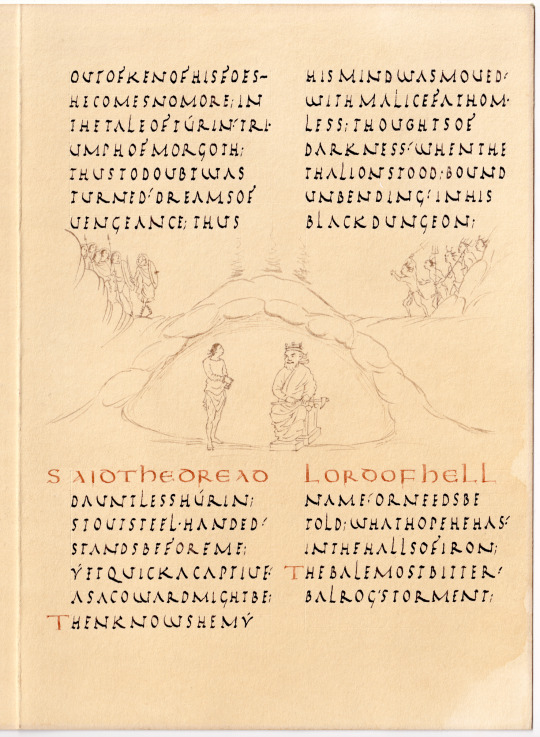
The Lay of the Children of Húrin
fol. 2v and 3r
#tolkien#the lay of the children of húrin#progrès!#note the metaphors depicted literally#tumblr didn't let me upload these at first but it worked in the end
39 notes
·
View notes
Text
Medieval Scorpions Effortpost
So yesterday I reblogged this post featuring an 11th-century depiction of the Apocalypse Locusts from Revelations, noting the following incongruity as another medieval scorpion issue:
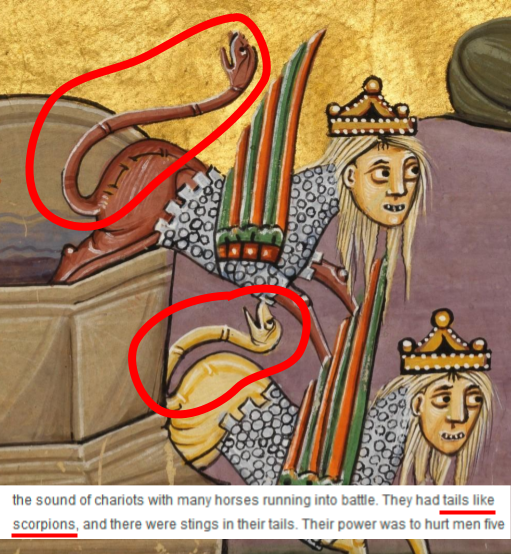
The artist, as you can see, has interpreted "tails like scorpions" as meaning "glue cheerful-looking snakes to their butts".
Anyway, it occurred to me that the medieval scorpion thing might not be as widely known as I think it is, and that Tumblr would probably enjoy knowing about it if it isn't known already. So, finding myself unable to focus on the research I'm supposed to be doing, I decided to write about this instead. I'll just go ahead and put a cut here.
As we can see in the image above, at least one artist out there thought a "scorpion" was a type of snake. Which makes it difficult to draw "tails like scorpions", because a snake's tail is not that distinctive or menacing (maybe rattlesnakes, but they don't have those outside the Americas). So they interpreted "tails like scorpions" as "the tail looks like a whole snake complete with head".
Let me tell you. This is not a problem unique to this illustration.
See, people throughout medieval Europe were aware of scorpions. As just alluded to, they are mentioned in the Bible, and if the people producing manuscripts in medieval Europe knew one thing, it was Stuff In Bible. They're also in the Zodiac, which medieval Europe had inherited through classical sources. However, let's take a look at this map:
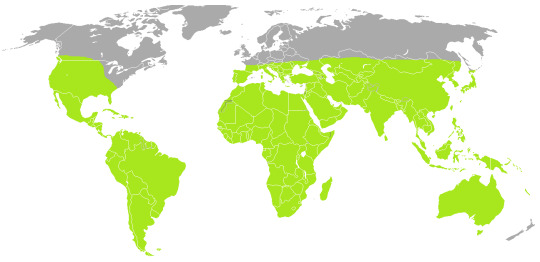
That's Wikipedia's map of the native range of the Scorpiones order, i.e., all scorpion species. You may notice something -- the range just stops at a certain northern latitude. Pretty much all of northern Europe is scorpion-free. If you lived in the north half of Europe, odds were good you had never seen a scorpion in your life. But if you were literate or educated at all, or you knew they were a thing, because you'd almost certainly run across them being mentioned in texts from farther south. And those texts wouldn't bother to explain what a scorpion was, of course -- everyone knows scorpions, right? When was the last time you stopped to explain What Is Spiders?
So medieval writers and artists in northern Europe were kind of stuck. There was all this scorpion imagery and metaphor in the texts they liked to work from, but they didn't really know what a scorpion was. Writers could kind of work around it (there's a lot of "oh, it's a venomous creature, moving on"), but sometimes they felt the need to break it down better. For this, of course, they'd have to refer to a bestiary -- but due to Bestiary Telephone and the persistent need of bestiary authors to turn animals into allegories, one of the only visual details you got on scorpions was that they... had a beautiful face, which they used to distract people in order to sting them.
And look. I'm not here to yuck anyone's yum, but I would say that a scorpion's face has significant aesthetic appeal only for a fairly small segment of the population. I'm sure you could get an entomologist to rhapsodize about it a bit, but your average person on the street will not be entranced by the face of a scorpion. So this did not help the medieval Europeans in figuring out how to depict scorpions. There was also some semantic confusion -- see, in some languages (such as Old and Middle English), "worm" could be a general term for very small animals of any kind. But it also could mean "serpent".* So there were some, like our artist at the top of the post, who were pretty sure a scorpion was a snake. This was probably helped along by the fact that "venomous" was one of the only things everyone knew about them, and hey, snakes are venomous. Also, Pliny the Elder had floated the idea that there were scorpions in Africa that could fly, and at least one author (13th-century monk Bartholomaeus Anglicus) therefore suggested that they had feathers. I don't see that last one coming up much, I just share it because it's funny to me.
*English eventually resolved this by borrowing the Latin vermin for very small animals, using the specialized spelling wyrm for big impressive mythical-type serpents, and sticking with the more specific snake for normal serpents.
Some authors, like the anonymous author of the Ancrene Wisse, therefore suggested that a scorpion was a snake with a woman's face and a stinging tail. (Everyone seemed to be on the same page with regards to the fact that the sting was in the tail, which is in fact probably the most recognizable aspect of scorpions, so good job there.) However, while authors could avoid this problem, visual artists could not. And if you were illustrating a bestiary or a calendar, including a scorpion was not optional. So they had to take a shot at what this thing looked like.
And so, after this way-too-long explanation, the thing you're probably here for: inaccurate medieval drawings of scorpions. (There are of course accurate medieval drawings of scorpions, from artists who lived in the southern part of Europe and/or visited places where scorpions lived; I'm just not showing you those.) And if you find yourself wondering, "how sure are you that that's meant to be a scorpion?" -- all of these are either from bestiaries or from calendars that include zodiac illustrations.
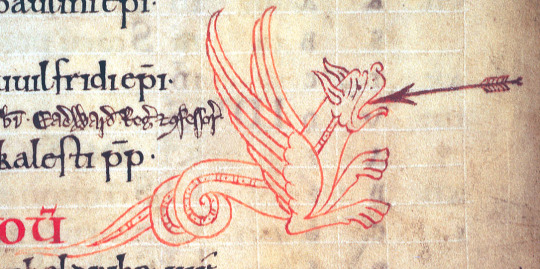
11th-century England, MS Arundel 60. (Be honest, without the rest of this post, if I had asked you to guess what animal this was supposed to be, would you have ever guessed “scorpion”?)
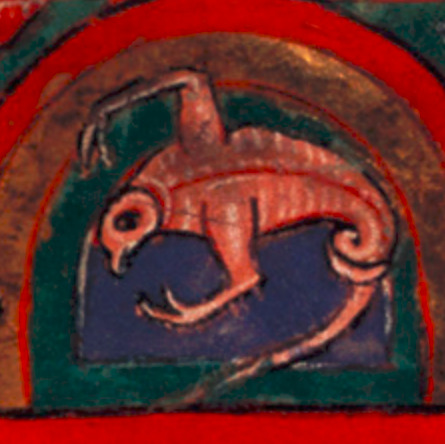
12th-century Germany, "Psalter of Henry the Lion". (Looks a bit undercooked. Kind of fetal.)
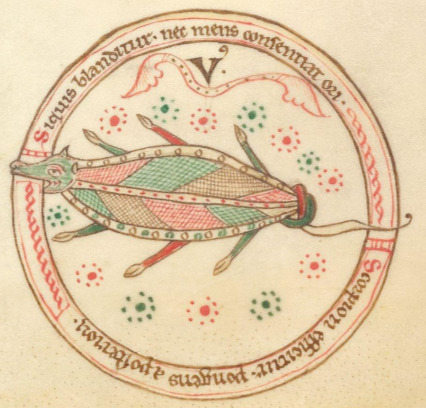
12th-century France, Peter Lombard's Sententiae. (Very colorful, itsy bitsy claws, what is happening with that tail?)
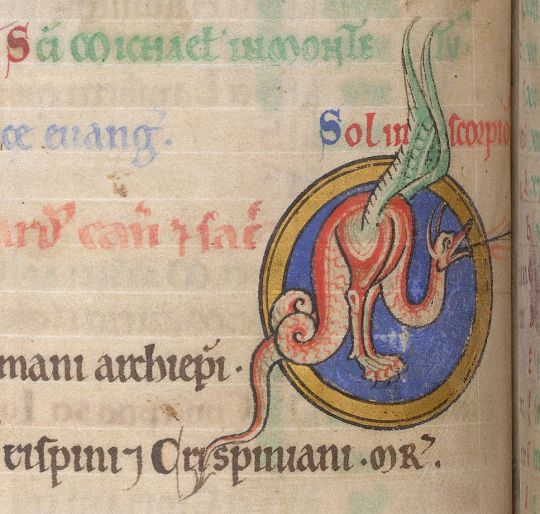
12th-century England, "The Shaftesbury Psalter". (So a scorpion is some sort of wyvern with a face like a duck, correct?)
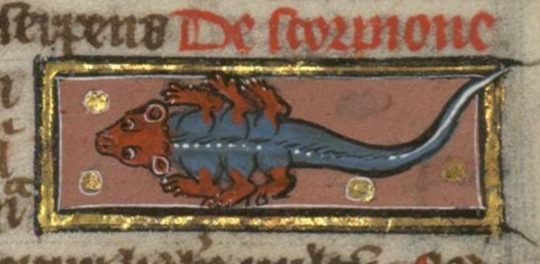
13th-century France, Thomas de Cantimpré's Liber de natura rerum. (I’d give them credit for the silhouette not being that far off, but there’s a certain bestiary style where all the animals kind of look like that. Also note how few of these have claws.)
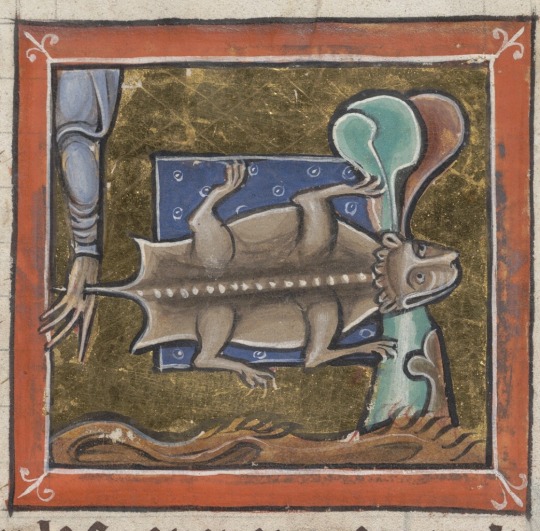
13th-century England, "The Bodley Bestiary". (Mischievous flying squirrel impales local man’s hand, local man fails to notice.)
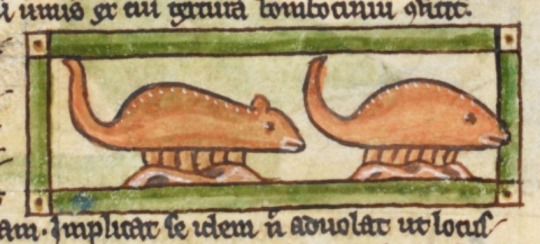
13th-century England, Harley MS 3244. (A scorpion is definitely either a mouse or a fish. Either way it has six legs.)
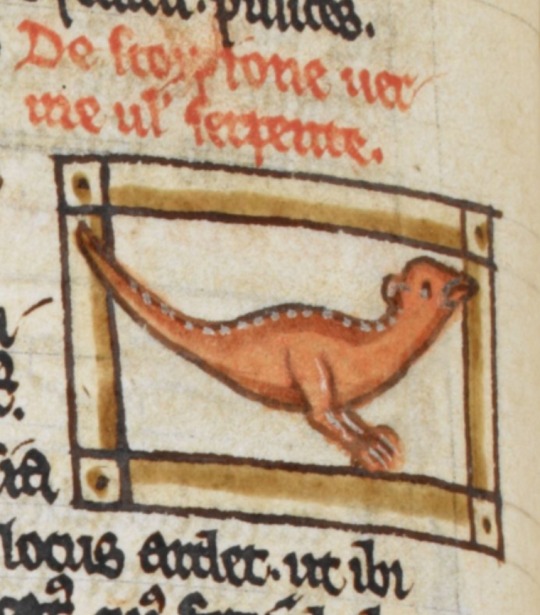
13th-century England, Harley MS 3244. (Wait, no, it’s a baby theropod, and it has two legs. (Yes, this is the same manuscript, that’s not an error, this artist did four scorpions and no two are the same.))

13th-century England, Harley MS 3244. (Actually it’s a lizard with tiny ears and it has four legs.)

13th-century England, Harley MS 3244. (Now that we’re at the big fancy illustration, I think I’ve got it — it’s like that last one, but two legs, longer ears, and a less goofy face. Also I’ve decided it’s not pink anymore, I think that was the main problem.)
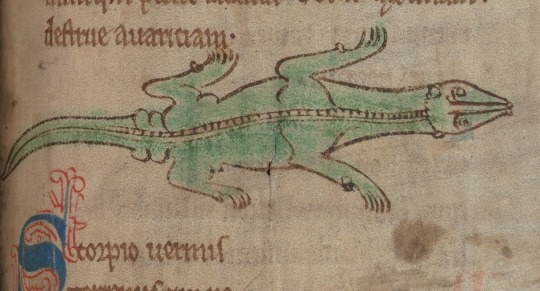
13th-century England, MS Kk.4.25. (A scorpion is a flat crocodile with a bear’s head.)
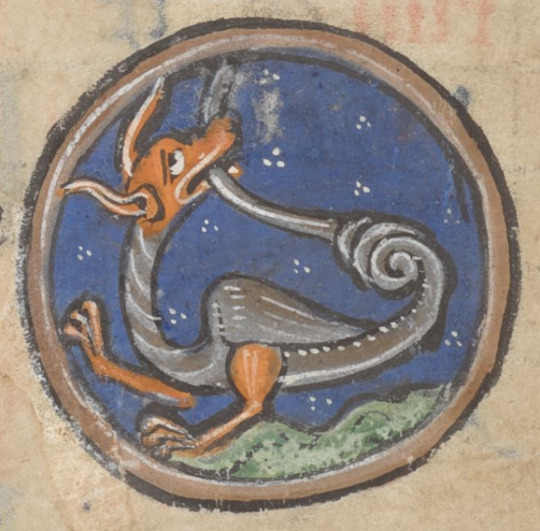
13th-century England, "The Huth Psalter". (Wyvern but baby! Does not seem to be enjoying biting its own tail.)
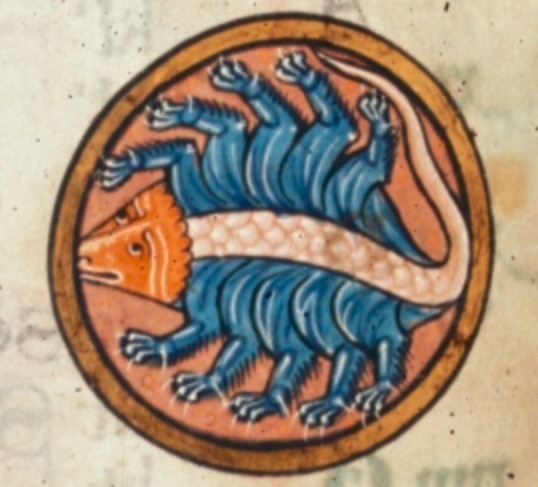
13th-century England, MS Royal 1 D X. (This triangular-headed gentlecreature gets the award for “closest guess at correct limb configuration”. If two of those were claws, I might actually believe this artist had seen a scorpion before, or at least a picture of one.)

13th-century England, "The Westminster Psalter". (A scorpion is the offspring of a wyvern and a fawn.)
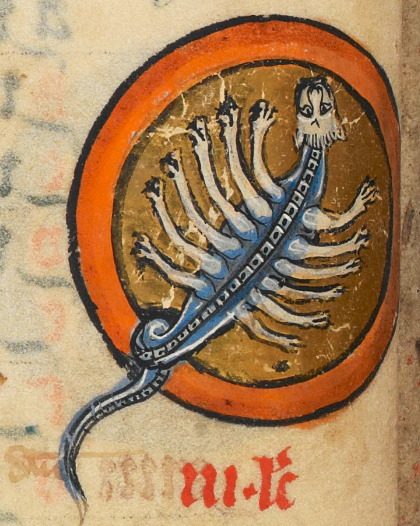
13th-century England, "The Rutland Psalter". (Too many legs! Pull back! Pull back!)
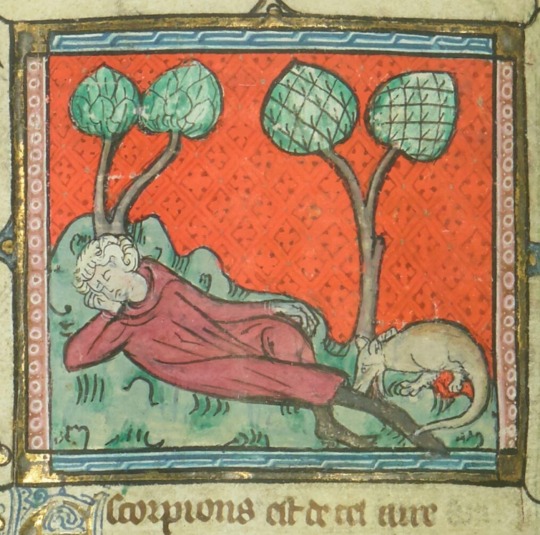
13th or 14th-century France, Bestiaire d'amour rimé. (This is very similar to the fawn-wyvern, but putting it in an actual Scene makes it even more obvious that you’re just guessing.)
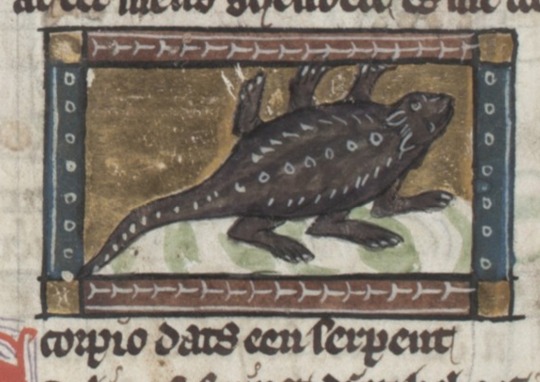
14th-century Netherlands, Jacob van Maerlant's Der Naturen Bloeme. (More top-down six-legged guys that look too furry to be arthropods.)
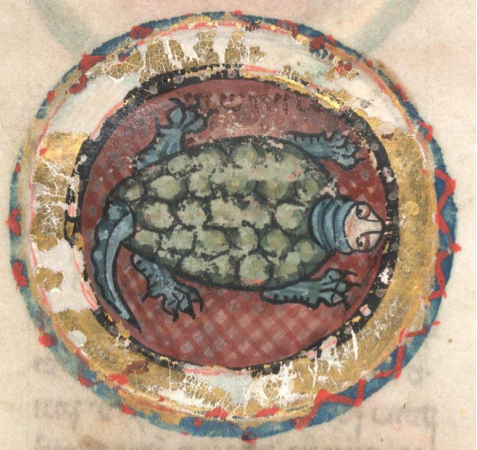
14th-century Germany, MS Additional 22413. (That is clearly a turtle.)
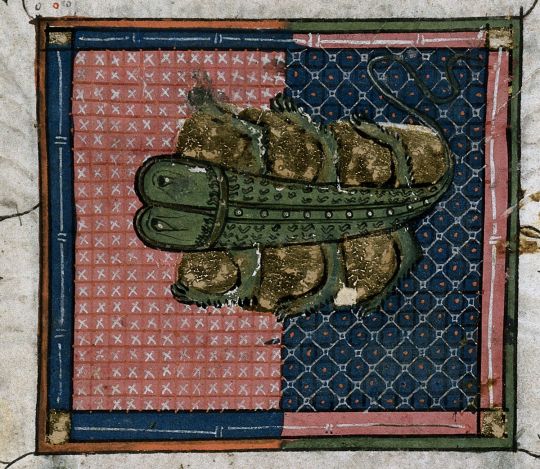
14th-century France, Matfres Eymengau de Beziers's Breviari d'amor. (Who came up with that head shape and what was their deal?)
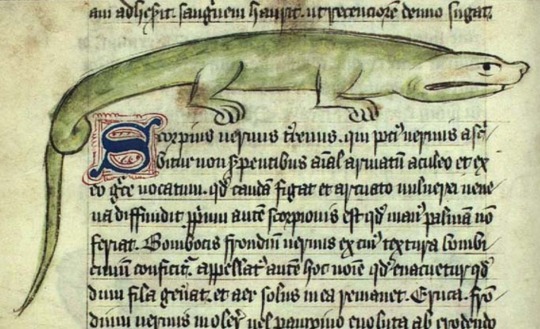
15th-century England, "Bestiary of Ann Walsh". (Screw it, a scorpion is a big lizard that glares at you for trying to make me draw things I don’t know about.)
I've spent way too much time on this now. End of post, thank you to anyone who got all the way down here.
#medieval#medieval creatures#medieval art#scorpions#medieval scorpions#manuscript#medieval manuscripts#illuminated manuscript
6K notes
·
View notes
Note
Can I please request Cater, Ace, Deuce and Epel helping you after a rough break up (with someone else, not them)?
‧₊˚✧ Let me love you until you love yourself ‧₊˚✧
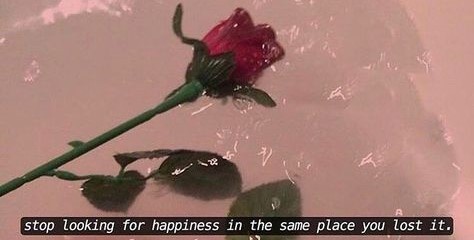
↳ Helping you after a rough breakup
feat: Cater ❋ Ace ❋ Deuce ❋ Epel
genre: hurt/comfort
note: no pronouns were used with the reader, reader is implied to be Yuu!reader, depictions of toxic relationships, implications of violence,
Similar prompt: finding out you got brutally rejected
2.7K Followers Writing Event 2023

You see, Cater already had a suspicion that your boyfriend wasn’t the greatest pick. Years of listening to his older sisters talk about red flags to look out has honed his sixth sense about these kind of stuff.
But what was he supposed to tell you? He’s not going to just barge into your relationship and tell you that he feels some off vibes about your man. All he could do was be there for you when you needed an ear to hear you out.
But he started to notice that you were less like yourself as the relationship went on. Your Magicam account wasn’t as active and soon even your close friends weren’t sure when was the last time you hung out with them. Cater could only catch you in class or with your glaring boyfriend clinging to you.
Your relationship finally hit an ugly crescendo when your boyfriend publicly humiliated you and ended things in the open hallway. The reason Cater learned was because you wanted to go out with your friends again, even if he didn’t want to.
Night Raven College has a knack for choosing students with rather vindictive personalities and no matter how subtle it is, Cater is no different. The sociable redhead may not always be the type to step up to lead or start something, but he is more than willing to teach a tactless underclassman a lesson on respect.
It doesn’t matter which dorm your ex is from since the extrovert Cater has friends and contacts of all the Housewardens, vice Housewardens and other notable students with authority. Call it his privilege for his chatty nature and years on this large campus.
With a charming set of words and implications from the smooth-talking Cater, most of them picked up the hint that a certain jerk needed some well-deserved punishment. For disgracing the dorm’s dignity, they all claimed.
With the personified ick dealt with, all of Cater’s attention is on you. The versatile upperclassman can be anything you need in your time of healing. Cafe dates, unhinged frustration venting, screaming karaoke sessions with a chill support group (an exclusive privilege courtesy of the Pop Music Club), or a judgeless crying session as he held you together both metaphorically and literally.
The screaming karaoke and dessert binging was fun and all, but the feeling of Cater’s warm hands as he gently rubbed your back as you hiccuped through your tears was a healing moment that left you raw but appreciative.
Perhaps there was a little bit of guilt, or even something deeper within his heart for you, but as he wrapped his arms around you closer whilst you fell asleep in comfort, Cater thought to himself to protect you from something like this for as long as he can stay with you, for as long as he could do to stay with you.
“Hey now, no tears. Cay-Cay to the rescue!”

Oh he hated your ex from day 1. No, it wasn’t because of his personal feelings for you, it was just literally everything about that jerk. At every chance, Ace would snidely comment and jeer the as*hole. The only reason he would stop was if you personally asked him to get along with him.
“Tch. Fine, I guess”
So Ace is a liar, but at least he’s a good actor. He’s willing to smile and laugh but he never lets the suspicious feeling fade.
That suspicion quickly became rage when Grim told him that jerk of yours broke up with you over text.
Turns out your (ex) boyfriend was dating you in hopes to catch the attention of a crush from his hometown, sending pictures in hopes to stir up some jealousy. Questions became screaming matches in your room and soon you were left a broken mess alone in your bedroom.
When Ace knocked on your door sometime later, you saw him in a familiar heart-shaped collar which wasn’t a surprising image. Without saying much, all Ace offered as a vague explanation was that he got into a fight with some jerk student.
As Ace was getting comfortable on your sofa, Cater later texted you, giving full details of what happened. Turns out the “jerk student” was your ex who was running his mouth oh how you were crazy and unbearable out in the courtyard, where Ace was passing by.
“Riddle is pretty pissed right now. Ace just went crazy on him and wouldn’t let up until we pulled him away. But still, be kind to him, k? He had good intentions.”
Sitting together on the sofa, the two of you made quite an interesting image. Your eyes were red with wet tracks all over your face from crying while Ace had swollen patches of blue and black on his normally boyishly charming face.
You broke the tension. “You didn’t need to do that, you know.”
Ace brushed your words off. “What are you talking about? I did it for me. That dude always rubbed me the wrong way.”
Ace is a liar, but strangely you didn’t mind it when he did it.
“Just so we’re clear, I didn’t do it for you. Alright? Good, so don’t go thinking too deep into it…”

A model student would support all of his peers, Deuce convinced himself. It was why he kept himself from just straight-up wrecking this punk that you found yourself dating. But Deuce trusts you. Maybe Deuce’s misjudging him since he can’t imagine you falling for someone beneath you, and he assumed that despite how he feels about your partner, this dude wouldn’t be stupid enough to not treat you good.
But unbeknownst to Deuce, arguments were common in your relationship with your insecure partner. From complaining that you don’t spend time with him (um, because you were busy saving your friends from overblot?) to outright blaming you for emasculating him in his own relationship because of your popularity in school for your accomplishments.
The breakup itself was honestly anti-climatic, and everyone could see it from a while away so it came to the surprise of no one.
It was the aftermath of all of the arguments with your ex that truly hurt you. What was once a source of pride to you became reasons of your anxiety as you wondered if your ex held truth in his accusations.
“You think you’re perfect ‘cause you’re doing a little better than me? Get over your high horse, you pretentious b-“
“Are you ok?” Deuce’s voice snapped you out of your spiraling thoughts, bringing you back to the library where you were helping Deuce with a subject he was failing.
You tried smiling but Deuce noticed the tenseness of your features and try asking once more, which led you to ultimately voicing your worries.
“Maybe I was being too boastful, I shouldn’t just talk about me- Wait, Deuce?!”
You managed to catch Deuce by the hem of his sleeve before flinching at the sight of the glaring rage in Deuce’s fiery eyes.
“Where is that no-good coward! That punk’s getting what's coming to him!”
It took some time (and getting kicked out from the library) for Deuce to finally settle his rage. Still, he was muttering some choice words to describe your ex which made you chuckle just a little. You wanted the breakup to be civil and simply pass as an unpleasant memory but you admit that seeing someone get mad for your sake was…nice. Almost heart-warming, really.
Suddenly, Deuce turned to face you. Back straight and his strong fist firmly pressed to his chest, Deuce looked to you with pure honesty as he promised to protect you from your worthless ex with everything he’s got.
It took you quite some time to admit that when Deuce made that promise, you felt your heart skip a beat.
“If anyone gives you grief for that, just ignore 'em. Let me handle them, I’m pretty strong.”

Romance honestly flies over Epel’s head. Afterall, the relationships he’s seen are his town’s couples who've been married for decades with kids all grown up, and the ones he’s seen in films and books. All he knew was, if you like someone and you’re dating them, you should be counting yer lucky stars and make sure you treat them right.
So, imagine the genuine look of surprise on his face when his dormmates whispered rumors that you were caught in an ugly argument with your boyfriend, with accusations that your man was actually cheating with someone supposedly prettier than you.
Now, imagine his unbridled rage when Epel found that it was true. Your ex-boyfriend apparently held high expectations of himself and the partners he deemed to be worthy by his side. While he settled for you, he was looking around for another companion that “best suits his standards” as he said.
It took a strict scolding and promise of harsh reprimanding from Vil to calm the young freshman down as his hometown habits rushed back to him. How he wanted to give that no-good son of a backyard mutt a mighty beating for what he did to you.
Instead, Vil suggested that Epel rather hit him where it would really hurt for unsavory fellows like him, through his pride.
“If he thought he was better off with someone that “best suits his standards” as he put it, try proving to him he ended up with what he deserved. ”
After deciphering what Vil meant, Epel used his noggin to hurt your ex where it really hurts. No longer was he the runt of a small village, but a man with various connections and skills to get a leg over his enemies.
With his persistence, he convinced his Spelldrive captain, Leona to sit with you during lunch, and have the Vil Schoenheit spoil you with high-end gifts in public. With the attention of the most famous students showing you favor, everyone in NRC whispered and commented on who really won in the breakup.
“He cheated while dating someone like that? What a mistake.”
Behind his soft expression, Epel mentally smirked at the plummeting image of the man who prioritized fame over love. "You darn right a mistake it was, he thought.
In the entire time Epel treated you like the most important person on campus…in public at least.
In the privacy of your dormroom, you worked hard in holding in your laughter as Epel swore up a storm like a drunken sailor about the worthless ex of yours. Like Vil, it’ll be up to you to make sure he won’t go off picking a fight with your ex.
Still, there was something undeniably true to Epel’s character to defend your honor, however he does it.
“I ain’t too good at these sneaky schemes, but you gotta admit I got ‘im real good. Don’t cha think?”
#twisted wonderland#twst#disney twisted wonderland#twisted wonderland x reader#twst x reader#twst imagines#twst scenarios#twisted wonderland imagines#cater diamond#twst cater x reader#ace trappola#ace trappola x reader#deuce spade#twst deuce x reader#deuce x reader#epel felmier#epel x reader#2.7k followers event
451 notes
·
View notes
Text
so skin is an episode about being hurt by your loved ones. the allegory is told through the literal torture and murder of girlfriends by a shapeshifter wearing the face of their boyfriends. the psychological aspect is just as important as the physical aspect for this shifter—it's a betrayal, something that will destroy both parties involved and ruin their relationship (if the victim makes it out alive of course).
the shapeshifter takes dean's face: he becomes the boyfriend-murderer, and sam is therefore the girlfriend-victim. it's the first time an episode has itself had an incestuous lining on a thematic level since the pilot (interesting too that the episodes that focus on sam have placed sam and dean in the position of lovers, whereas the dean-focused episodes until now have been more platonic in nature).
throughout the episode, the emotional B story depicts both sam and dean hurting (betraying) the people who trust them. sam, for one, is trying to maintain a relationship with his college friends, but he's lying to them. it also seems like he's not being very communicative with them in the first place, since most of his recent messages are people asking where the hell he even is:

(side note, i love that sam is apparently friends with two people named john and mary. feels weirdly psychosexual)
he hurts rebecca, and zach by proxy, later in the episode by lying to her and contaminating the crime scene. his lying, through the lens of the allegory, is framed as a betrayal of trust—metaphorical abuse and torture.
the shapeshifter also brings up another betrayal: sam leaving for stanford, betraying his brother and stealing his life away by forcing dean into a difficult position where he has to abandon his own dreams so that sam can pursue his.
this is victim blaming. the shifter is hurting people because he thinks they deserve it, because he's the true victim here, because he was shunned from society and treated as a freak. this episode portrays the monster as imprinting on dean, rather than sam or dean imprinting on another character. it's the second time a parallel has been drawn between the monster and one of the brothers, the first being pilot.
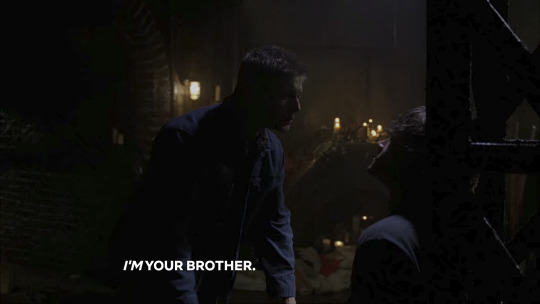
the shifter speaks for dean: dean is jealous because sam has friends, a life—and dean is just a freak. the B story of the episode starts with dean telling sam that it's for the best if he cuts his ties with people, and up until this point in the episode dean is portrayed as being unilaterally correct, because sam keeps hurting people as a result of his lying.
but now it's given a different framing. even if what dean has said isn't incorrect, we can see it through a lens of selfishness and jealousy. does dean want sam to give up his life because it's truly for the best? or is it because dean wants what sam has, and he'd rather neither of them have it than watch miserably as sam achieves what he's given up on?
misery loves company.

dean apologizes for what he said at the start of the episode at the end of it, but the shapeshifter dug dean's memories and feelings out from somewhere. because the shifter is imprinting on dean, it's likely that his own experiences are intensifying the secondhand feelings he's receiving from dean, but even if that is the case, there's still something there—it's possible that right now, dean still isn't fully aware of it himself. it's possible that he is and is just trying to bury it.
regardless, we're still getting a rare glimpse into dean's true feelings here, however biased they may be. as dean's fear of abandonment unravels, dean himself is slowly coming undone, and this begins to take on a more prominent part of each episode. the ending scene of phantom traveler, too, is revisited in this same conversation:

if episodes 1-3 are introductory to sam, dean, and john respectively, then episodes 4-6 make an interesting trilogy about dean's fear of abandonment. phantom traveler introduces dean's fears and then reveal a scene at the end where dean perceives john as betraying him. bloody mary, too, includes a scene where dean perceives sam as betraying him by not being open and honest with him about his secret. these events are synthesized in this episode and elaborated on, and the fears that have been underscored through the past two episodes are finally given voice.



anyway, tangent aside, all of this culminates in the blurring of lines between the shapeshifter wearing dean's face and dean himself: there's very little difference between sam's big brother and the monster they're fighting. it helps that they share the same sentiments and anguish toward the world, the same jealousies, the same fears. where does the shifter end and dean begin? how much does the shifter speak for himself, and how much is extrapolated from dean's secondhand feelings?
is dean the real monster in this story?

skin is an episode about being hurt by your loved ones. the shifter takes on the likeness of various women's boyfriends/husbands. there's also an implication toward the episode that the shapeshifter uses this setup to have sex with women he finds attractive:


there is, of course, no real point for the shifter to undergo what appears to be the rather painful process of transforming back into dean after shedding rebecca's skin once he captures sam. except that this episode is about betrayal. the psychological torture is just as important as the physical torture for this shapeshifter. and the shifter finds girls he likes and uses their lovers' faces to destroy them.
dean is the lover. sam is the girl. the lines are clearly drawn here, made stronger by the sheer amount of overlap shared by dean and the shapeshifter. it's important to the shifter that dean is the one who is going to hurt sam, because the connection between sam and dean makes the violence that much more painful.

he says that sam should "appreciate" dean more than he does. it adds to the idea that dean feels "all alone" and that he wants someone to love him. dean's core desire is for family: dean wants his family to love him. he thinks sam doesn't love him, but sam should love him. again sam is blamed for a perceived betrayal, dragging up more and more of the minute details across the last several episodes that point to the emotional distance between them. dean wants those gaps closed, and sam is trying to keep them apart. skin is an episode about being hurt by your loved ones.
just like in the pilot, sam and dean are thrust into overtly romantic positions via the allegorical A story. a monster who has victimized girlfriends is assuming the role of dean and victimizing sam. like in the pilot, the character onto which sam and/or dean imprint is the antagonist, the monster. two lines are crossed in both of these episodes: the boundary between hero and villain, and the boundary between family and incest. doubt is cast on the roles they occupy, and that doubt breeds the gothic anxiety which allows for the nature of sam and dean's relationship, both to each other and to the world, to be questioned.
perhaps then it's only natural that shortly after this episode is where the integral running gag begins and sam and dean start getting mistaken for gay lovers. they stand within the liminal space that separates the acceptable from the taboo, and in doing so they become both, neither, everything all at once: brothers, lovers, boyfriends, girlfriends, tempting and unfaithful and desiring of something they can't have.
sam wants to go home. dean wants someone to love him. in the end, all they have is each other.

(fascinating, i think, how this is the episode where the idea that they're "freaks" is introduced, not only once but twice. very peculiar language)
#liveblogging: supernatural#1.06#wincest#samdean#sam winchester#dean winchester#this is such a long post but like. how am i gonna write something short about SKIN of all episodes#i'm so not okay about skin it makes me sooooooo crazy. this is my 4th time watching it and it still drives me insane#spn posting#.txt#spn1
98 notes
·
View notes
Text
Quetzalli on Trafficlights and Birds

Well @toxictoxicities, it has been done! You gave me the chance for me to give my own interpretation on this matter, and I can’t resist chances to add some narrative significance! I decided to make a separate post on it because what I came up with ended up being long (as always with me), and in case anyone else would enjoy these thoughts.
However before I go in with this essay I've put together I have to give a very important note: These thoughts are gonna be primarily based around my personal interpretations and headcanons for Seven Red Suns and No Significant Harassment. I’m generally a person who needs to know exactly what I’m working with to do something well, and as such my ideas about metaphors, symbolism, and greater narrative significance typically depend a lot on me understanding the characters and ship not just in their general dynamic, but various other deeper elements — what their core desires/fears are, what their backstories/histories are, each of their main character traits and why they are that way, then from there what they see in each other and why their relationship benefits each other in-universe, and what other effect(s) the relationship has or could have on the characters in-universe as well as the greater narrative out-of-universe, with the additional optional knowledge of what the main plot of the story they come from is to possibly tie in important moments. Seeing as you probably aren’t going to explain your Trafficlights interpretation completely to this intense of a degree anytime soon (though I’d absolutely enjoy hearing it whenever it comes!), if I’m going to make some metaphors I think the best option is to just use my current character interpretations so I have this background familiarity, especially since I’ve actually been developing these things a whole lot for my own iterator off-the-string happy ending AU!
Also, I want to say to that if some of these idea sound familiar, it’s because I realized I can actually project some of my previous Lilypad ideas onto this Trafficlights portrayal as well. I feel my Suns and Moon are similar enough in their personality traits that many of the same dynamics and significance could reasonably apply. In fact Tox, I’m gonna admit I actually did take some inspiration for my Lilypad portrayal from seeing your particular Trafficlights and drawing my own conclusions about how that dynamic worked, and overall my depiction of Seven Red Suns is largely inspired by your own take on that character, which I found quite unique compared to the rest of the fandom for being the first one I saw to show Suns as being far less imposing and confident internally than they seem in public. So I guess I am once again coming full circle now!
I think this is already more than enough words, but I just felt the need to give those prefaces as context for all of these ideas. With that being said, I hope you like at least some of these!
-.-.-.-.-.-.-.-.-
Option 1: Birds as Freedom
From what I’ve read, a common symbolism for birds is freedom, which to me is easy to see because of their signature flight ability. Flight can be considered the mode of travel with the greatest freedom because it’s not restricted by landmasses (or even planets, if you include space travel), and because flying is literally defying, or “freeing oneself” from gravity, one can easily associate it with weightlessness and thus being carefree and without worries or negativity.
With any off-the-string iterator story, it’s easy to give going off-the-string a positive significance because it’s literally the puppet “freeing itself” from the limited confines of their chamber, and by extent the limits imposed upon them by the Ancients. This is further supported by how some iterators in canon do appear to perceive their cans as a limitation or cage, as evidenced by the broadcast dialogue. In fact, I've heard No Significant Harassment is one of these very iterators, so I imagine he’d absolutely want to go off-the-string so long as he has a good incentive to.
To relate this back to birds, you could very much use a caged songbird as a metaphor for the iterators; beautiful, brightly-colored creatures “raised” in captivity and trapped in boxes to serve other people, once “singing” out their ideas from within to those people, but now just giving those “songs” to each other. Thus, going off-the-string (perhaps to the Emergence facility in your AU) could be seen as these “birds” finally flying free to be with one another “in the wild”, finally able to fly and live their lives more fully as they were denied for so long. So regardless of any other symbolism, Trafficlights — and any other off-the-string iterator ship by extent — leaving their cans could be seen as them “flying free” together from the restraints forced upon them.
However, I’ve also recently realized another freedom symbolism besides freedom from the Ancients’ restrictions, and that’s freedom from their own. This is something more impactful to my Seven Red Suns, who like Moon, is also someone who hides a lot of his true personality for a more polite, proper, and dignified public persona, shoulders a lot of weight he isn’t always able to handle alone, and puts lots of limits on himself and what he’s “allowed” or “supposed” to do, albeit for entirely different reasons. Now contrast that with Sig, who although he also hides a lot of his true feelings and knows when to dial it down, is someone who is a master at breaking rules and going against convention. In fact, I like to imagine it’s literally in his nature (er, programming) to think outside the box, generating all sorts of different ideas to solve problems that don’t always totally follow outside rules or what’s “typical” for using a certain item.
When you bring these two together, I imagine Sig could absolutely be the one to encourage Suns to let loose more, letting down his proper and and uptight persona to show more of his emotional side and explore things he didn’t allow himself to before (like I said, this is one of the ideas that works with Trafficlights as well as Lilypad)! It’s as if Suns is a bird too used to living in the cage and afraid to truly fly again, and Sig has to coax him out into embracing that freedom. You could even take this with the idea of iterators not being used to romance, a restriction Suns absolutely puts on himself and even others because he believes a “proper” iterator isn’t supposed to have such deep attachments, of which romantic love could be considered the worst because it’s both breaking Karma 3 of Companionship and can directly lead to Karma 2 of Sexual Intercourse, so it’s essentially a double-risk. But again, Sig is willing to explore these new feelings, and now that they’re off the string and can love each other more physically and directly than ever, what better time could there be for Suns to “spread his wings” and fly alongside him?
Option 2: Birds as Passion/Romance
To me, the second biggest symbolism that birds can have is that of passion and general romantic ideas. Technically all birds could have this association because feathers and wings in general are pretty showy, so spreading one’s wings could just as easily be a gesture of great emotion and expression as it could be preparing to be free. In addition though, whereas the previous point was more related to songbirds, this seems to correlate more with birds of paradise especially, who have the most colorful and varied plumage of the bird kingdom, thus making it easy to say they’re “showing their true colors” without fear. Some birds of paradise, particularly parrots/parakeets/macaws/etc. are very social creatures by nature, so it’s even easier to draw the connection between their vibrant plumage and social behavior with being expressive and outgoing.
As for the romance element, to me it seems birds are commonly used as such symbols already; there’s doves and swans being symbols of love often included in some way at weddings, words like “lovebirds” referring to lovers as well as one of my favorite words, “twitterpated”, which means to be very smitten and infatuated and also has a clear bird-based association and maybe even origin. But then there’s the idea of songbirds singing to each other, which I think is a particularly romantic idea which plays into one of my favorite shipping tropes I call, “answering the call”. So far, I like to describe it as when someone is looking for companionship and romance for a while, either openly or as a subconscious desire, but is eventually found and “answered” by someone willing to love with them. It’s such a romantic idea to me because it often includes so much loneliness and sometimes even tragedy before, making that moment where they finally find someone all the more sweet!
Okay, now to bring this back to Trafficlights. Starting with the first idea, I think it’s easy to associate Sig with these kinds of birds, especially macaws and such, seeing as I imagine he can be just as “colorful” both literally and personality-wise, and cares deeply about his relationships in a similar manner. But even then, like I mentioned before Sig can sometimes feel like he needs to hide those feelings because others don’t fully understand him and he doesn’t want to risk creating tension (although hiding his feelings like that kinda does anyway).
To resolve this, I’ve decided to use what I imagine Sig would appreciate and value in Suns that would evolve the relationship past friendship to romance, that being that Suns was one of the first people besides Moon who believed that Sig’s ideas and his dedication to his friends could be something more, something better and used for good. My Suns is defined largely by his perfectionism and endless drive to make things the “best” versions of themselves. In my timeline of events he already helped Sig in that way during a pretty important moment, not to mention it’s just really inspiring how much Suns cares about trying to bring about the “best” for everyone. On Sig’s end, this is how they at least developed a friendship, and in this alternative what would cause that appreciation to evolve to romance eventually. In fact, in my headcanon it was the combined efforts of Moon first understanding Sig’s feelings and Suns helping to perfect his role in his group, with both of them working really hard to help him find new belonging with the Local Group, that was what got Sig out of his “rough patch”. Thus, in a way, Suns directly helped Sig make new connections, “spread his wings”, and “find a new flock”, which can easily be the main reason why Sig would fall for Suns.
Now, what about Suns? Relating him to birds and passion also hinges largely on another pretty crucial headcanon about my Seven Red Suns, which is that he is secretly a huge romantic with a passion for the fine arts. In addition to striving for an “ideal” world at all times, he appreciates art and the deeper symbolism within. However, because of what I said earlier about Suns placing a lot of high standards on himself, he doesn’t actually make art of his own, believing it’s “not an iterator’s place” to do such a thing themselves because it’s not in their purpose. But even then, he can’t help himself from seeing things artistically and drawing his own conclusions about things.
That being said, I imagine Suns could have a strong appreciation for birds in particular; their beauty, combined with their flight, makes them seem as though they’ve already “ascended” on some level above other animals. On top of that, I think Suns would come to see Sig as sort of a bird himself! Maybe a big green macaw with the most beautiful plumes who’s also far more intelligent than others think. But even more so, when it comes to what Suns appreciates in Sig that causes him to fall in love, I imagine it’s how Sig is the only person who sees through his facade for who he really is. Everyone else around him seems to either put him on a pedestal, with their own high expectations to follow, or is intimidated by his grandeur into avoiding much direct contact. Again, however, Sig naturally thinks outside the box and challenging people’s ideas, so it’d be pretty easy for him to break down some of Suns’s diplomacy to show that more emotional side (another idea that I use in Lilypad as well). No Significant Harassment is the one person Suns feels like he can be himself around, helping him realize that even those parts of him he hides make him “perfect” by virtue of being his real and unique self. It’s like Suns is a great eagle, looked up to and feared by other birds as a large bird of prey and thus lonely and pressured to soar above all else, and only the surprisingly smart macaw is able to lower his guard, helping him see he’s just as beautiful and inspiring on the ground as he is soaring high in the clouds.
And then there’s the idea of “answering the call”. I’ve already seen your Trafficlights will probably play out as a slow burn, with Sig and Suns harboring growing feelings for each other for a while but only really acting on it once Emergence kicks in. In this case the dynamic would be mutual, with both of them longing for a deeper connection, but perhaps not realizing it until this timeline. I imagine Sig would be the one more conscious of this desire though, seeing as he openly seeks connection with others, so it’d be as if he’s a lonely songbird wanting to sing out but never getting an answer. And then of course, when Suns finally does respond it’s that much more poetic!
Trafficlights as Rio (spoilers, by the way)
OKAY HEAR ME OUT, I just have to include some words on this because this movie, this freaking movie is not only one of the two that kickstarted my love of birds but is what started this whole Trafficlights-as-birds-symbolism thing for me.
To give some context, if you don’t already know I am someone who not only loves making metaphors and symbolism with my ships, but loves finding associations between them and outside music or stories. I often look for connections to the old Disney animated fairytales, but I really end up doing it to all sorts of animated stories that I believe have pretty universal themes.
That being said, if there’s any association I’d make for Trafficlights as I currently see them, it’s to Blue Sky’s Rio and some of the scenes from that story. Firstly, Blu as a character already somewhat parallels my Suns in that he’s awkward and not the best at interacting with others. Not to mention his inability to fly, which came from him never getting a chance to embrace his emotions before being captured and taken from his home, could be paralleled to Suns’s bottling up his emotions, especially since flight in that film is directly related to feelings of happiness, love, and freedom, so Suns in a way is also “stunted” in his emotions. Meanwhile Sig on the other hand is more like Jewel, someone who at least understands his emotions a lot better and thus “knows how to fly”, and who resists others’ attempts to cage him and tries to get his partner to do the same. Like Blu Suns refuses at first, his logic and desire for a dignified self image getting the best of him being able to let loose in any environment where he isn’t surrounded by close friends.
Then there’s the freaking “Hot Wings” scene, which takes the most responsibility for this association of mine. Largely because the two side-characters, Nico and Pedro, also seem to carry a dynamic with their lyrics that just reminds me of Suns and Sig, respectively, a lot (honestly I just thought about it on a whim one day and I can’t unsee it now…). Not to mention the entire scene is about pretty birds dancing, which given you’ve also made a decent number of drawings of Trafficlights dancing together, I think is just super fitting. And then Jewel’s singing once again brings back this idea of freedom and showing one’s emotions and love, with the remaining question being whether or not Blu can eventually unlock this feeling inside him despite his fears and fly up with her. This is something I think could work with Trafficlights, at least how I see them, for even if Suns can be more emotional around Sig and maybe his friends, he still has trouble doing so in public, not always liking the pressure of being “perfect” but not wanting to risk looking like a fool around everyone who looks up to him.
It works even better with one of the later scenes in the film when Blu and Jewel finally manage to cut the chain keeping them together, which causes Jewel to immediately lift into the sky with the pure joy and euphoria of once again being free to fly as she pleases. However, Blu is left looking up at her as she flies with their friends, and you can tell he’s both realizing again just how beautiful she is and longing so much to join her in the sky, yet still unable to fly. Once again I can’t help seeing Suns in Blu’s place, looking at Sig having fun and being so carefree, loving the feeling of being off-the-string, and him thinking Sig so beautiful and wanting to join him too. And eventually, just like Blu does in a true “answering the call fashion”, he is able to “spread his wings” and they finally can fly away together!
-.-.-.-.-.-.-.-.-
Okay, I think that’s all I have to say for now on this topic. This essay, excluding the preface at the beginning, is 2498 words! I think that might be a little bit more than my Lilypad essay! I really hope it delivered!
But even then, this was so fun to do! Even though Trafficlights isn’t my main ship and isn’t going to happen in my own AU, I’ve recently been looking to better figure out Sig and Suns’s relationship anyway to understand why they’re at least friends with each other. Of course there are some other factors in their relationship, some of which I’ve edited out for the sake of these ideas because it throws a bit of tension in the dynamic that could compromise its ability to work as a ship, but this was still an important aspect and I’m glad to have gotten a chance to develop it! And then of course, a reason to think about ships as well as shamelessly plug one of my favorite movies ever is also very nice!
This may all sound super silly and maybe none of it works with your Emergence Trafficlights, but regardless this was seriously such a fun opportunity, and I’m glad you gave me a reason to do this! I would love to hear your thoughts on or additions to all this, if you can!
#others: toxictoxicities#art#artwork#sketch#drawing#digital#digital art#fanart#rain world#shipping#rw shipping#iterator#rw iterator#no significant harassment#NSH#rw nsh#seven red suns#SRS#rw srs#trafficlights#rw trafficlights#quetzalli draws#quetzalli headcanons#quetzalli's thoughts
70 notes
·
View notes
Note
hey, just wanted to say thanks for the rec for Cat Girl. it is the best kind of extremely uncomfortable! but it's got me musing on your note about the relevance of the cat girl element itself. I agree that it is depicting an abusive relationship, but it's clear that Peter is completely incapable of perceiving that that's what it is, because he's so far down a deeply screwed hole of ideology. (continued in a sec, hang on-)
- so Peter is the way he is because he has accepted a series of small explanations for the things in his life as seeming accurate, that has stacked up into a deeply dysfunctional worldview that he's too deep into to question at all. so I think the Literal Government Issued Cat Girl is very much a metaphor for a society-level case of "you don't question your own idea of normal". rather than address the root of the problem, a wildly unethical bandaid has been slapped on it.
in other words; Peter doesn't question that his ideas are correct, when they're obviously very skewed. but the society that gave him Andi doesn't question that it is normal for people to get this twisted up in an effort to make sense of the world. of COURSE there are internet chuds, people like Peter existing is "normal". and in the process of just accepting that some people are unsalvageable, innocent people like Andi get hurt, and that's just "normal" too.
Peter isn't unfixable. it's clear he could be better, WANTS to be better, because he is straight up miserable. but he doesn't consciously know that, or how to start. the decision that some people are just fundamentally screwed up and there's nothing anyone can do about it doesn't just hurt him, it lets him hurt the people around him. Andi is, metaphorically, everyone else being tossed under the bus alongside Peter by the simple act of treating him like he's just inherently a shitty person.
Man, this is a long ask! If I were the author of Cat Girl, I'd be honored to see someone spend so much time thinking about it. But I don't think I agree, exactly.
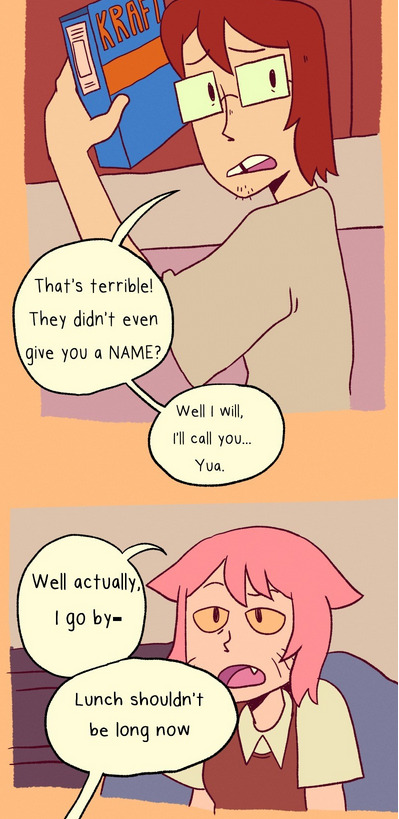
Peter wants to "be a good person", yes, but his understanding of what a "good person" is is completely self-centered. Him calling Andi "Yua" while talking over her trying to explain that she does in fact have a name is obviously establishing him as a douche, but it's also worth noting that "Yua" is a Japanese name. He's thinking of her as an anime waifu and not a person (or, given the first results when I google "Yua", a porn star, but maybe it's a Breath of Fire 2 reference)
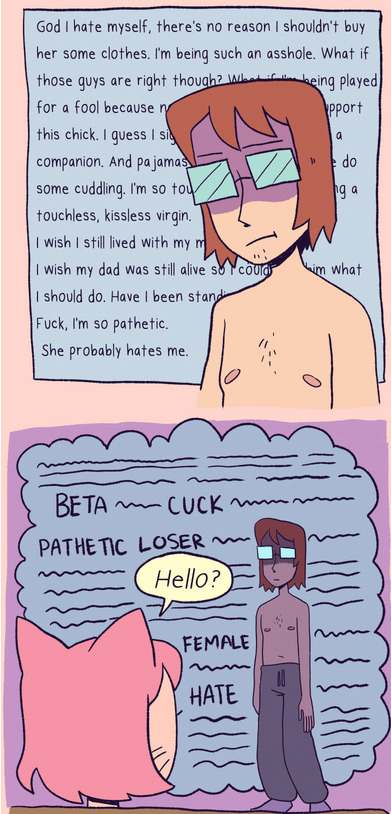
And while he falls into depressive self-loathing after she complains about not having a change of clothes, his internal monologue is entirely about himself. At no point, ever, does Peter even consider that Andi has feelings or is anything other than a reflection on him.
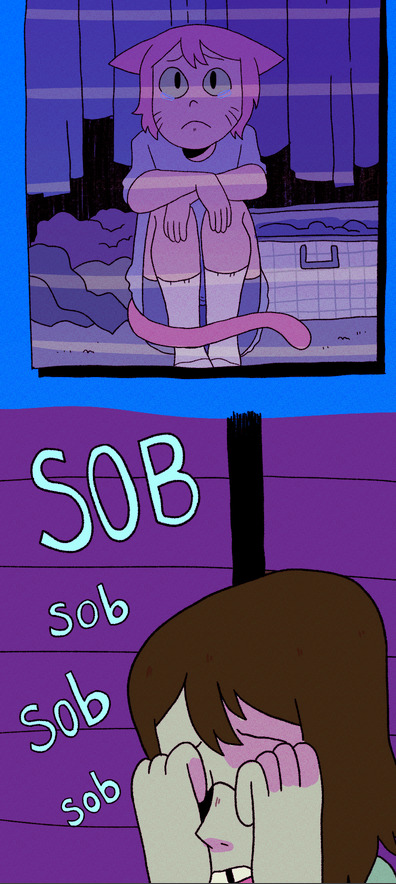
When he locks her in a closet, his most overtly abusive act, he starts crying because he feels bad about what a bad person he is, but even while he's crying he's simultaneously blocking the door, which is a very literal depiction of their relationship. His angsting about being a good person is not his way out of the problem, it is the problem. He never even once considers being nice to Andi because she'll like it, it's entirely "I don't want to force her to have sex with me (because that would make me feel bad), but maybe if I'm nice to her she'll initiate the sex". And he doesn't even care about the sex itself, just the implicit validation of being Confirmed Good By A Girl.
Peter is the way he is because his morality is entirely self-centered. Andi is a way for him to prove his morality to himself (well, try to and fail), not an actual person whose feelings he's ever considered except for if she hates him or not. That's what makes him such an interesting villain, he keeps concocting a story in his head where he's the poor sweet babu trying his best and never stops doing that to let his girlfriend out of the closet.
51 notes
·
View notes
Text
Nina
Here's why I think Nina isn't a good metaphor for Aziraphale and his situation re: heaven. (There are some similar elements, but their overall arcs are by necessity going to be very different.)
NINA'S PARTNER LEFT HER. There is at least a chance that Lindsey has actually let her go.
That is a crucial distinction.
You see, it is INCREDIBLY DANGEROUS for victims to leave an ab*sive partner. That is when the ab*ser is by far most likely to try to murder them. (This is why so many victims of ab*se don't try to leave until an incident happens where they know their partner is literally minute away from killing them. It's not because they're "spellbound" by the ab*ser or happy with them or any of that crap that people assume. It's because they know their partner will do everything in their power to hunt them down and kill them if they leave. So they don't leave until they literally know death is inevitable if they don't. Side note, if you're going to leave an ab*sive relationship, even one that's only "mildly" ab*sive, please please please have a safety plan in place first if at all possible). Ab*sers do not let their victims just walk away.
The ab*ser being the one who leaves is in so many ways a more desirable outcome, for that reason. I hate to use this word, but Nina was "lucky" (and I'm speaking relative ONLY to Aziraphale here, to be very clear - she certainly isn't lucky relative to all the people who don't have to deal with ab*sive relationships) that Lindsey left her - because she doesn't have to worry about what Lindsey would do to her if she left them. (Side note, though: I wouldn't be at all surprised if she is not, in fact, rid of Lindsey for good, and we see them pop up again in S3. That would be an accurate depiction of how these relationships often work.)
Whereas heaven has not left Aziraphale and is never going to. They are never going to let him be safe with Crowley. AND AZIRAPHALE KNOWS THAT, Y'ALL.
Idk where I was going with this, but I think y'all get the idea.
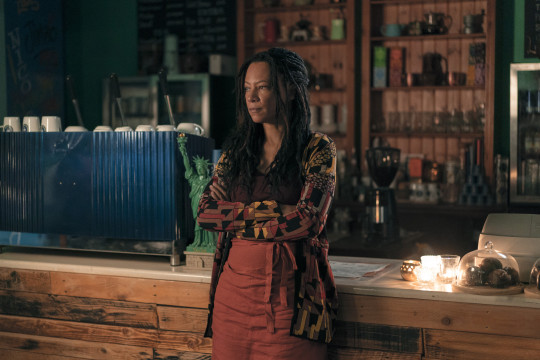
35 notes
·
View notes
Note
On the one hand, it is absolutely a sign of the complexion of the dev team and of the times that FNV has little to no presence of real life Indigenous people. Not "tribals." Real Indigenous nations that live in that general area like the Mojave, Paiute, Apache etc. On the other hand, I think using groups like the great khans, the unnamed "tribal" from Hanlons stories, the zion tribes, as props to hammer in on US settler colonialism in general and of the actual US state of California in particular, is pretty clever. That is, these things can be shown to the player without using the pain of Indigenous peoples, their lives and their blood, as a way to carry that message. If the massacre at bitter springs had been of Apache it would be less effective and in very poor taste, in my opinion. I think overall the criticisms are still valid, but I think theres some interesting alternative interpretations.
But on the other hand, the allegory falls apart because the khans AREN'T the victims of colonialism. In the first game and onward they are chattel slave owning rapists. They are more of a criminal gang than a distinct culture. And in FNV theres the suggestion that the khans are defending themselves and are victimized in the mold of Indigenous tribes which fought the US and attacked settlers. But in reality, they are objectively in the wrong when attacking the NCR (don't deserve to get massacred, but still), and the genre fiction of the whole thing breaks the metaphor. Like applying anti colonial rhetoric to the hells angels.
Like how the allegory of ghouls as a marginalized group breaks down entirely with the introduction of feral ghouls in fallout 3. While some ghouls in prior entries might attack on sight, this was only if the player got close, and they weren't really a danger. So people having this hard on about hating ghouls in fallout 1 and 2 was meant as entirely illegitimate. That allegory doesn't work after f3 since we are meant to think that at any moment, for no known reason, they can turn into a cannibal corpse. The genre fiction of it all spoils the thing.
anyway, read cadillac desert.
this is exactly what i mean by the "baggage" of fallout's depiction of "tribals" and even just the word "tribal" to describe its various disparate post-apocalyptic nomadic groups, because while they can be used as you say to brush up against indigenous identities allegorically, there is a very deafening silence coming from the lack of actual indigenous people as well. it can't help but imply that these fictional groups are 1:1 substitutes for the thing they're depicting allegorically, with a mixed degree of intention and success, because there's no counterbalance or counterexample to either contrast these allegories against reality or even further ground them in it.
you run up against this a lot in genre fiction. the X-Men, for example, have served as a clumsy allegory for marginalized identities and civil rights struggles for decades, with several mixed attempts to try to reconcile its fictional symbolism with acknowledgement of what's real and literal. my own personal bugbear is that while I absolutely love Jadzia Dax in Deep Space 9, I would have loved it even more if Jadzia was a real actual trans woman that Dax had implanted itself into, or even if Jadzia Dax at least had a regular mundane non-alien trans woman bestie to queen out and compare notes with.
and yeah, the whole thing about feral ghouls being completely hostile sight with zero alternative interaction potential (and the same goes for powder gangers as cartoonishly evil victims of an empire's carceral justice system, and fiends as cartoonishly evil drug addicts, and...) is that videos games are constantly trying to stage endless combat encounters for gameplay reasons while also not making the player feel bad about slaughtering endless combat participants for narrative reasons. (and the powder gangers are only shoot on sight if you get vilified by them, but the first non-tutorial quest in the game is either helping them kill everybody in the town that just saved your life because they're harboring the guy they tried to mug, or...stopping them from doing that by killing them instead).
27 notes
·
View notes
Text
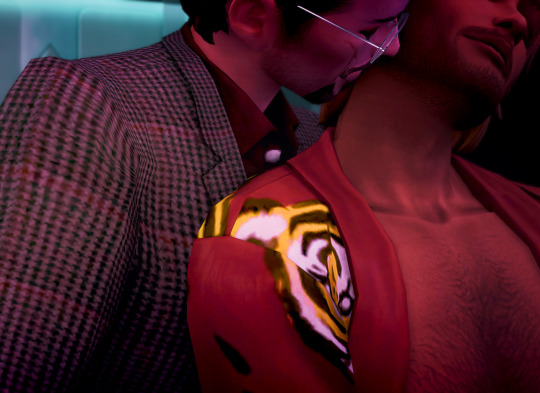
SIDE PLOTT - PURE HEDONISM - PART 1 🔞
- 𝙶𝚎𝚗 𝟼: 𝚅𝚊𝚕 𝚊𝚗𝚍 𝙲𝚑𝚊𝚍 -
heat level: 🌶🌶🌶🌶🌶 (It's Smut with a Plot)
content warnings: simdick, choking, graphic depictions of gay sex, I'm literally warning you now!!
Forward: This scene is something that I wanted to write anyway for the main plott eventually, and the PG-13 parts will end up popping up again in the main storyline - but for Valentines smut sake I thought it would be fun to jump ahead and take way farther than reasonably necessary.
Godspeed. Don't say I didn't warn you.
PART ONE: ( The One with the Plott, Rating PG )
PART TWO: ( The One with the Smut, Rating R )

[ 𝐅𝐚𝐥𝐥, 𝐘𝐞𝐚𝐫 𝟏𝟎 ]
Shortly after finding himself on the receiving end of the beratement of a lifetime, Valerian announced to that perhaps it was time for everyone to get some rest.
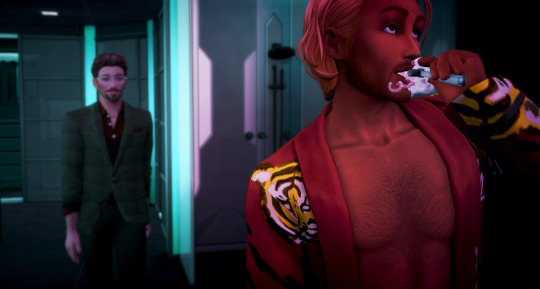
And yes, perhaps it was just a hurried excuse to retreat upstairs with his metaphorical tail placed firmly between his legs- but so what?
He much preferred the comfort and privacy of his own bedroom anyway.
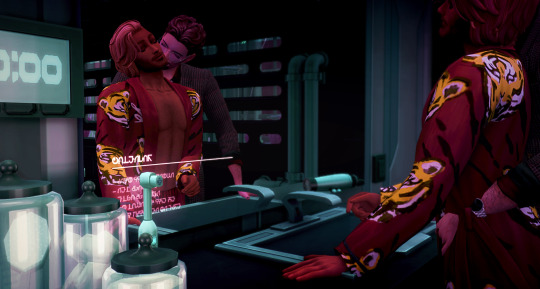
There, to his relief he found his fiancé finishing up his nightly routine- cut short by both the lack of expensive creams- left in his room upstairs, and an incessant, tired kiss carefully placed in the crook below his jawbone; Val wrapping his stray arm around Chad's torso.

Val let out a frustrated sigh against his neck, his lips refusing to vacate their favorite spot.
"That bad?"
"You are hereby banned from leaving me alone with that woman ever again." he grumbled as Chad let out a small snort in response.

"Sunny's tucked in?"
"All taken care of. Now it's your turn, wash up- it's been a long day."
"You are too good to me."
"And don't you forget it."

Chad pulled the taller man down to meet his height, rewarding him for the day's bravery with a warm, familiar, and well practiced kiss before pushing him towards the shower.
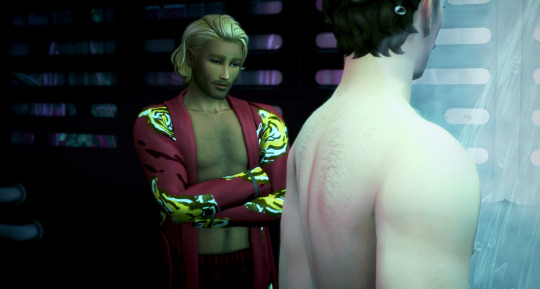
Valerian conceded to being undressed by his fiancé, layers of expensive wool and tweed crumpling to the ground unceremoniously as he was placed under a running shower head- hot water washing away the pent up stress.
Turning, he saw a dark cloud pass over his partner's face.

"Something is bothering you."
It wasn't a question. After years together Val could place a meaning to Chad's every tick and glance. If asked, he could chart a map of his face, noting every wrinkle with a time and place of origin.
"Is it that easy to tell?"
"Distractingly so."

Chad's thoughts flashed back to his conversation earlier in the evening- Poppy was right, per usual. Had it really been 10 years?
"I've been thinking-"
"A dangerous practice indeed." Val flashed a wry smile as he maneuvered past him towards the main portion of the bedroom.
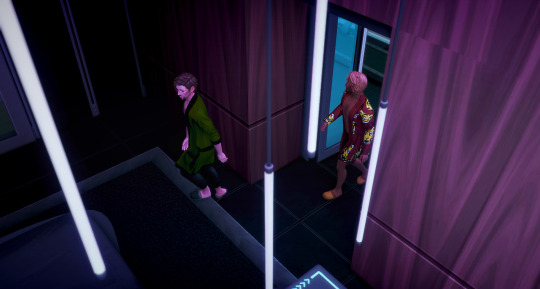
"Valerian-"
"I don't understand how you can tolerate that insidious woman."
"Val, she's your sister."
"Don't rub it in. Coming in here like she bought and paid for the place, rattling off a list of my flaws and failures.
This is my home damn her, I am happy- WE are happy."
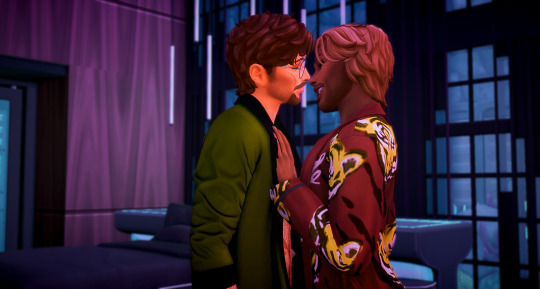
Chad skirted around Val as he concluded his rant, silencing him with two hands placed on his partner's bare chest, still damp from the shower.
"That's actually what I wanted to talk to you about."
"Please do not tell me you actually agree with that wretched snake of a woman."

"Valerian, how long have we been together?"
"Ten years, two seasons, and thirteen days," he replied with no hesitation, as if he had been running a counter to keep track, "Leanne can provide you with a more accurate estimate if required."
"No, no, that's fine."
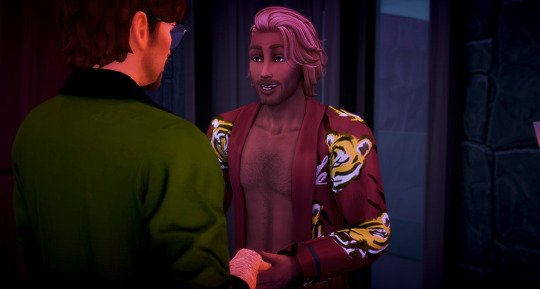
"Val, do you remember the promise you made me in that elevator, 10 years ago? Do you remember what you told me?"

"Ten Years, two seasons, and thirteen days-" he corrected him, in a way that most sane people would find annoying. "But yes, of course." he finished.

Chad drew him in close again, their heartbeats complementing one another as they often did.
"Valerian Plott, will you marry me?"
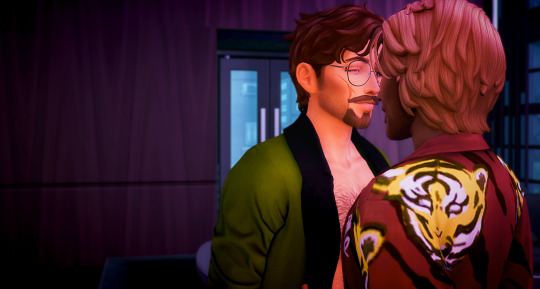
"Took you long enough."

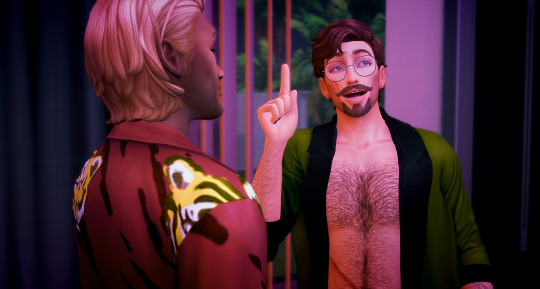
Before Chad could even attempt to pull the man closer for a kiss to finalize the moment, Val had sprung back with a newfound energy and vigor, addressing the house AI directly.
"HANSEL please inform Leanne that her presence is requested immediately."
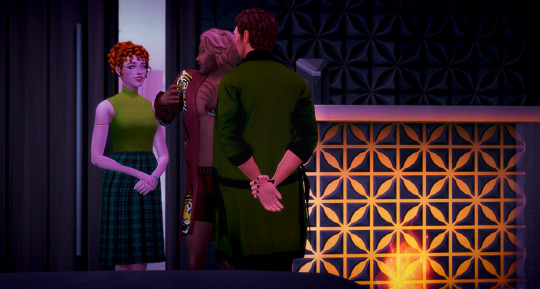
"You called?"
"FUCKMEwheredidyoucomefrom-" Chad yelled, nearly jumping out of his skin details, as Leanne appeared to instantaneously materialize behind him like some sort of electronic ghost.
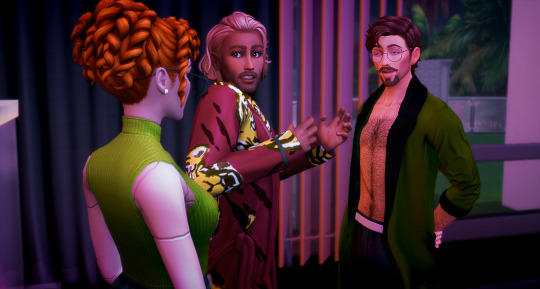
"Yes, thank you Leanne." Valerian replied coolly, unfazed by her rapid appearance. "Mr. Chinsley has just informed me that he wishes to resume the nuptial process."
"Very good sir, shall we begin with the vows then?"
Chad hurriedly cut them both off.
"What!? Not RIGHT NOW!"

Val studied his partner quizzically.
"Correct me if I misspeak, but did you not just directly express to me you'd like to finalize our long delayed marriage?"
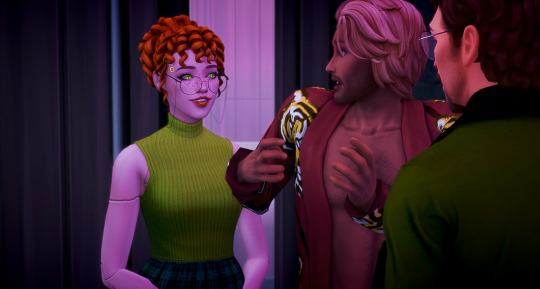
"But- there's a whole process! Paperwork to file, things to plan!" Chad shot back, visibly confused at how the moment had devolved so rapidly.
"Correct. Vexus has kept the documents on retainer until he received final confirmation from Party B- that would be you Mr. Chinsley."
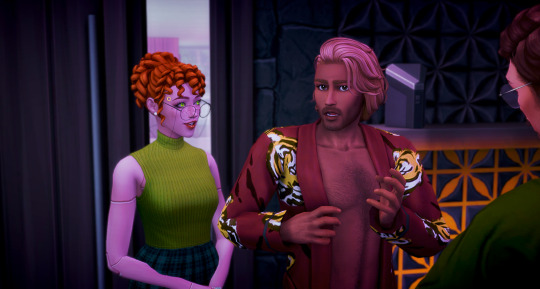
The cogs started to turn in the back of Chad's cerebral cortex.
"You've had the documents… filed."
"Yes sir."
"For how long exactly?"
"Ten Years, Two Seasons, Twelve Days, Sixteen Hours, Thirty-Six minutes, and 12, 13, 14, 15 seconds. We've had to re-file after every patch."

Chad slowly swiveled back to meet Val's steel coated irises once again.
"You're psychotic."
"Thank you for noticing Agent." Val raised his eyebrows, amused at the compliment. "Now, shall we continue? Leanne please pull up the vows on file. Draft D6 Please."
"Right away sir."
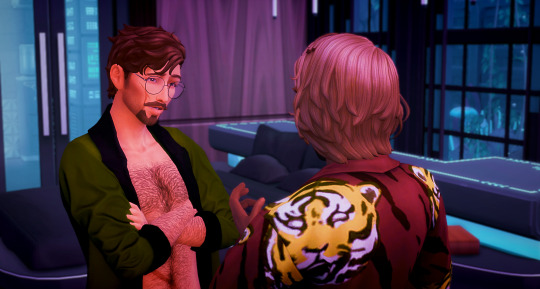
The supervillain readjusted his gaze to that of his partner, confidence dropping slightly as he finally paused to study Chad's reaction.
"You're upset."

"Valerian, tell me truthfully- when I asked you to marry me, did you think I meant right this exact moment?"
"Well obviously," the villain replied plainly, before continuing, "But if you wish to include Helianthus in the process, I can have HANSEL wake her up and send her down-"

Chad cut him off, moving forward slightly to place a hand on either side of the man- steadying him for what he would say next.
"Valerian, I want a wedding."
A heavy anticipatory silence that fell over the room, as the Agent waited for a response from his fiancé.
"Oh."
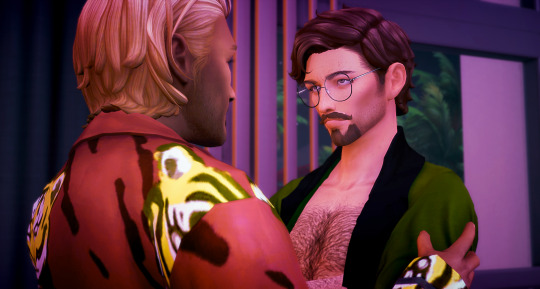
Chad watched on as Val's countenance grew dark- a familiar weather pattern rolling in, his cold eyes growing stormier- as a thundercloud raged behind his glasses.
He slowly released his grip, the look was familiar to him of course- Valerian was not processing this request well.
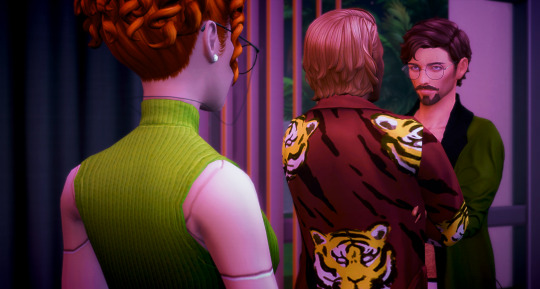
He readjusted his focus to his assistant, who had been silently observing the interaction with the AI approximation of befuddlement.
"Leave us."
A simple order but one that lashed out from his mouth like tropical lightning snapping the branch off an unlucky tree.
"Yes sir."
( CONTINUES TO PART 2 🔞 )
42 notes
·
View notes
Note
I’m looking for someone who can crack Amy Dallon open for me, and lakesbian thought you might have ideas! Everything about her is so interesting: being a body manipulator who brands herself as a healer, being a kid with the weight of the world on her shoulders, being raised by a woman who resents her, falling in love with her sister because she’s never felt like she belonged to the family. But when I think about the mindrape and the fleshpuddle, I bounce right off. They’re so over-the-top evil actions that I can’t conceive of a theory of mind for a her. So…thoughts about Amy?
to start with thoughts: i like amy. i like her a lot even! probably top 5 characters in worm to me. i think she's probably one of the most homophobic characters ever written and i also think she's incredibly tragic and compelling
to begin with, the first bit of mind control was, for all intents and purposes, an accident. victoria hugs her, amy's overwhelmed, and in the heat of the moment essentially literalizes her desires by making victoria like her. she's instantly remorseful and offers to fix it, but victoria's horrified and runs away. there's a lot of discourse surrounding the degree to which it was or wasn't accidental, but to me, the fact that she Immediately regrets it and that the text describes it as a semi-conscious reaction puts it pretty thoroughly in the camp of 'didn't mean to do this'. imo, if you were to Remove powers from the situation, it would be the equivalent of amy going in for a kiss -- she's overwhelmed and her guard's down from how emotionally bruised and battered she is and she does something rash, only powers make everything worse and more extreme and it turns into that whole clusterfuck instead. so, like, is amy accidentally or mostly accidentally making victoria like her back okay? obviously not, but i do think its an understandable Mistake to make
with the second bout of mindcontrol, its obviously dicier. not accidental, to start with, but while fucked up and wrong, there Is a rationale. amy wants victoria to be okay. victoria might die or be permanently disfigured because of her injuries by crawler. victoria won't let amy heal her because of how disgusted and angry she is at amy. obviously its better that victoria's healed, so amy decides to do what's best for victoria against victoria's wishes. (worth noting that taking it upon yourself to Do What's Best for someone else against their express desire is exactly what victoria did when she hugged amy despite amy's warnings) so amy mind controls her again, harder this time, and convinces herself that she's going to fix victoria's body And Then turn off the love effect. it's fucked up, unjustifiable, and wrong, but i think you can See how amy comes to make that decision, through a combination of a genuine humanitarian argument (victoria needs to be healed or she might be disfigured forever) and self-delusion (i'll not only be able to do this in the state the city's in, but i'll fix victoria's mind when i'm done)
and then there's the time when she turns victoria into a car. years down the line metatextual information and ward confirm it to be an instance of literal, rather than metaphorical, rape on amy's part, but i don't think that was the intention in worm and it's not my preferred interpretation (i think it's an insane idea that wildbow, who with his own words said he wouldn't depict rape in worm more explicitly than what the implications of heartbreaker's power portray, would write it as rape and then spend an insane amount of screen time focusing on amy and her story after that point while continuing to portray her broadly sympathetically). whatever the case though, it's an instance of amy going through with a gross violation of victoria's mental and bodily autonomy. the facts of the in-universe power mechanics remain the same whichever the interpretation -- amy, frazzled and traumatized, couldn't fix victoria anymore, her power not making the correct adjustments to her form.
amy convinced herself that she would spend some time with victoria while she licked her wounds and then remove the mind control and let her go, but she couldn't even fix her back into her old shape. it is an evil act. it's fucked up. but it's not... out of nowhere, you know? it's a culmination of amy's obsession and self-delusion and the lingering mental health crisis that's been hovering over her all book finally coming to a head, making her fall down a rabbit hole of self-justification that says that it's alright that she does this and that because it means she can fix victoria only to end up being wholly unable to fix her At All, and in fact only making victoria Worse
so like. i think amy does fucked up things to varying degrees of culpability and "forgivability", but there's definitely Reasons for why she did them, even if they're fucked up or not very good
by the time we get to ward there's no qualia whatsoever though lol she's just an evil devilspawn
102 notes
·
View notes
Text
William Blake and Good Omens - an intertextual analysis
Please note: I did another version of this and posted it, but it was quite hurried, way too short, and was incorrect in a number of ways so I deleted it. However it had already been reblogged by the time i did so. If you happen to see another version of this meta that's not the right one, this is the version I'm happy with!
After my previous post re William Blake and Good Omens did so well, and so many people showed an interest I've decided to do a more in depth piece. This is focused upon the TV version of Good Omens, not the book.
Please don't tag Neil in this - although it's mostly textual analysis I do a very small amount of S3 theorising, and I know he doesn't want to see that.
I am in no way suggesting that Neil and Terry specifically wrote Good Omens with Blake in mind, I honestly just wanted an excuse to write more about Blake because I love his work so much, and I thought it would be interesting to try and apply some intertexuality since the works will contain similar themes, both being about God, religion, humanity, and angels and demons.
I also should stress that I am not an expert on Blake, there are people far more qualified to comment on him than I. I'm just a former literature student who loves his work.
There have been many different interpretations of Blake's work over the years, so it's completely fine to disagree with someone else's ideas about it, as with any work of art or literature. And although this piece is likely to be long, I'll barely be able to scratch the surface of all the possible meanings that could be ascribed to it.
Much like the old adage that if someone claims to understand quantum physics they're lying, I'm not sure anyone can truly fathom the full meaning of Blake's philosophy (especially in his later prophetic works, fuuuuuuck those beasts....), so if you're confused by him don't be discouraged, that's perfectly normal!
That being said, I wish to discuss the parallels between Good Omens and The Marriage of Heaven and Hell, my personal favourite and probably the most accessible of his longer works.
"Without contraries is no progression. Attraction and Repulsion, Reason and Energy, Love and Hate, are necessary to Human existence.
From these contraries spring what the religious call Good & Evil. Good is the passive that obeys Reason. Evil is the active springing from Energy.
Good is Heaven. Evil is Hell."
This excerpt is from near the opening and sets out the central idea of the work - that there is an essential duality to humanity, and each person is a combination of extremes. These extremes are not at war with each other, but rather are equally necessary, hence the "marriage" of the title. "The Marriage of Heaven and Hell" is a metaphor for the human experience.
Consistently throughout The Marriage... Blake refers to the two extremes as Reason and Energy. These terms could be construed in a number of different ways: thought versus emotion, mental versus physical, restraint versus desire, temperance versus excess, caution versus impulsiveness, and following the rules versus free will.
Blake's use of the word "Reason" in this context may be somewhat confusing, however he likely chose it because of his negative feelings towards science and the Age of Enlightenment. Blake saw literal visions of angels and prophets and the divinity of all creation, and hated that science reduced everything to formulas, calculations, and materialism, leaving the world bereft of wonder. "Art is the Tree of Life. Science is the Tree of Death" as he put it.
His ideas about "reason" are best expressed by his painting "Newton". Though inspired by the scientist, it is not a portrait - instead it depicts a figure deeply engrossed in scientific drawings and calculations, totally ignoring the beauty all around him - see below.
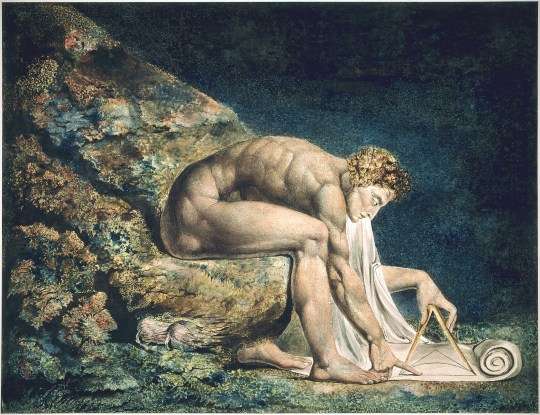
In the context of The Marriage... Reason is "passive" because it involves thought, caution, self-restraint, and doing what you are told, all states which block action. Energy is "active" because it is physical, emotional, impulsive and allows you to act based on your own choices and desires. It's quite clear that Blake feels "energy" is the preferable state - he tells us as much in the next section:
"The Voice of the Devil
All Bibles or sacred codes, have been the causes of the following Errors.
1. That Man has two real existing principles Viz: a Body & a Soul.
2. That Energy, call'd Evil, is alone from the Body, & that Reason, call'd Good, is alone from the Soul.
3. That God will torment Man in Eternity for following his Energies.
But the following Contraries to these are True.
1. Man has no Body distinct from his Soul; for that call'd Body is a portion of Soul discern'd by the five Senses, the chief inlets of Soul in this age.
2. Energy is the only life and is from the Body and Reason is the bound or outward circumference of Energy.
3. Energy is Eternal Delight."
So the body is an aspect of the soul, not separate from it, Energy comes from the body, it is Reason which places limits upon Energy, but Energy is eternal delight. Physicality, desire, impulsiveness, emotion, sensual pleasure and free will are not wrong or evil, they are aspects of the human soul and it is from them that we derive our enjoyment of life.
This does not necessarily mean that Reason is always bad. After all, Blake tells us that both are necessary for human existence. Sometimes temperance, caution and thought before action are required. But Reason becomes negative when it "usurps its place and governs the unwilling", i.e. when it completely supplants Energy and becomes the sole guiding factor, forcing passivity.
The Angels of The Marriage... are governed by "systematic reasoning", therefore they are wholly creatures of Reason. They are also "all religious" meaning they believe the "errors" stated above. His Devils by contrast "hate religion" meaning they believe the "contraries", which are the true statements according to Blake. It does not necessarily follow that they are wholly governed by Energy, merely that they believe Energy is "eternal delight".
It is worth noting at this point that Blake saw God and religion as totally separate. For Blake, "God" is that connection with divine wonder which was integral to his life; he tells us plainly that "all deities reside in the human breast" and that "the voice of honest indignation is the voice of God". In other words all humans have a direct and intuitive link with God and don't require the church, Priests, or a religious framework and adherence to a set of rules in order to reach moral decisions. These rules exist only to "enslave the vulgar".
The importance of this ability to make one's own choices about a moral course of action is shown by one of the "Memorable Fancy" sections of The Marriage...
Blake relates how a Devil is able to use an Angel's "systematic reasoning" against them:
"if Jesus Christ is the greatest man, you ought to love him in the greatest degree; now hear how he has given his sanction to the law of ten commandments: did he not mock at the sabbath, and so mock the sabbaths God? Murder those who were murder'd because of him? Turn away the law from the woman taken in adultery? Steal the labor of others to support him? Bear false witness when he omitted making a defence before Pilate? Covet when he pray'd for his disciples, and when he bid them shake off the dust of their feet against such as refused to lodge them? I tell you, no virtue can exist without breaking these ten commandments; Jesus was all virtue, and acted from impulse, not from rules."
The Angel has no way to refute the "reasoning" that Jesus was governed by Energy and "impulse", i.e. his own morality, the "voice of righteous indignation", not reasoning and the rules laid down by Heaven. And because Jesus is the Messiah he must be virtuous, therefore Energy is virtuous. The Angel immediately allows himself to be consumed by fire and is resurrected as a Devil.
How can these concepts apply to the world of Good Omens? This was where my first draft was totally incorrect, as I tried to transfer Blake's ideas about Angels and Demons and Heaven and Hell wholesale, applying "reason" to Aziraphale and Heaven and "energy" to Crowley and Hell. In fact the divide is slightly different in the GO-verse: Crowley and Aziraphale *both* represent Energy, and it is Heaven and Hell that act according to Reason.
At first glance Aziraphale may appear to toe the line - he needs creative application of the rules to make him comfortable with trying to avert the apocalypse, and when he doesn't like the way matters are being handled by the Archangels he seeks a higher authority and goes straight to God. He'd clearly prefer someone to be confirming the rightness of his actions for him. However this doesn't mean that he won't act on his own.
Immediately upon his introduction to the story he has given away his flaming sword, an action that he took impulsively because he felt it was right, not because someone told him to. It bothers him, but he does it anyway.
In the Job storyline, though he initially looks for some loophole within the rules that will allow him to save Job's children, in the end he directly goes against Heaven to do it, even though he believes he is going to Fall and become a Demon for having done so.
Though he resists it and exhausts all other possible avenues first, he eventually does take an active role in averting the apocalypse in S1.
He hides Jim at great personal risk to himself and against the will of both Heaven and Hell, again because he feels it is the right thing to do.
He is therefore perfectly capable of independent action from a position of "righteous indignation".
On a more basic level, he enjoys worldly pleasures, which all come from "energy" according to Blake's philosophy. Food and drink most obviously, but also books, music, dancing, theatre, art and so on.
Crowley is more easy to place as acting from Energy - in spite of the obvious aesthetic differences between them, he also loves worldly pleasures. Alcohol and coffee, snazzy clothing, driving his car with Queen blaring on the stereo, going to lunch with Aziraphale, Shakespearean comedies. All things he isn't supposed to want or need, and which baffle other Demons, in the same way that Aziraphale's desire for food baffles the Angels.
And he's absolutely willing to act according to his own moral impulses when they conflict with Hell's orders (or Heaven's), be it saving Job's children, ensuring that Elspeth doesn't die by suicide, or averting the apocalypse. Yes, he'll try to hide his "good" actions in order to avoid punishment by Hell, but he's firmly "on his own side".
Conversely, Heaven and Hell are both part of the structure of religion in this story, are strictly adherent to a set of rules, and their inhabitants appear to have no real desires of their own, other than possible advancement within the systems they uphold. They are "passive" in that their functions allow the status quo to continue and the "great plan" to unfold as they believe it is meant to, even though each side expects a different outcome.
Again, applying Blake's philosophy, I would say the reason for this is that "energy is from the body". Crowley and Aziraphale have both been given bodies in order that they can exist on earth, and *have* existed on earth for 6000 years, therefore "energy" - physical pleasures and free thinking - have become a part of who they are.
On a more fundamental level, possession of a body can be equated to humanity, and humanity has been shown as the most powerful force of all in this story, its influence having led to Adam becoming "human incarnate", and thus acting according to what he feels is right, instead of fulfilling the function he was destined for.
Heaven and Hell contain no material objects, and the Angels and Demons are spiritual beings, having no bodies, so they are not open to energy, and therefore are wholly governed by Reason, and the preservation of the religious structures within which they exist. Structures which, as for Blake, may not actually have anything to do with God herself. In S1 she is a distant observer, clearly aware through her narration of all that is going on, but not interceding in any way. In S2 she is barely present save for her voice being heard briefly in Job, and overlaid with Gabriel's on two occasions.
Bearing all this in mind, what predictions can we make regarding S3 by applying Blake's philosophy?
"The ancient tradition that the world will be consumed in fire at the end of six thousand years is true, as I have heard from Hell.
For the cherub with his flaming sword is hereby commanded to leave his guard at [the] tree of life, and when he does, the whole creation will be consumed and appear infinite and holy, whereas it now appears finite and corrupt.
This will come to pass by an improvement of sensual enjoyment."
The parallels of the cherub with his flaming sword, and the passage of 6000 years should be obvious to anyone reading this - they have of course been lifted directly from the Bible as they are in GO.
I have read some metas which speculated that Aziraphale's bookshop, or perhaps Earth itself, is a metaphorical stand-in for Eden or The Tree of Life. Aziraphale has been commanded to leave his "Eden" and will now be instrumental in causing the whole of creation to become infinite and holy, but Blake tells us this will be done by an improvement of sensual enjoyment, which arises from Energy not Reason.
Sensual enjoyment is something which is intrinsic to Aziraphale's character, and this could make his placement in Heaven very important.
Putting aside all the "final fifteen" theories and taking matters at face value, Aziraphale tells us that if he's in charge he can make a difference - he needs to subvert the system from the inside out. The most subversive thing of all could be that a sensualist who acts according to "the voice of moral indignation" and "Energy" has become the supreme Archangel. We have seen in Blake how a realisation that Energy could be virtuous was enough to convert an Angel into a Devil (incidentally, does the image of an Angel being consumed by fire and emerging as a Devil seem familiar at all...)
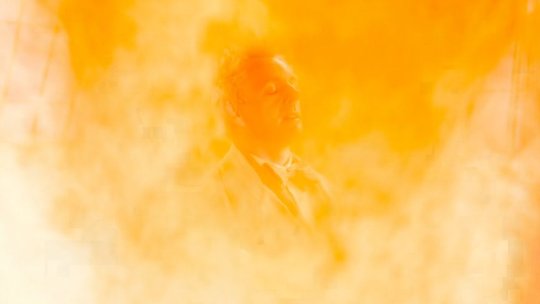
We may have seen the beginnings of this already. Gabriel and Beelzebub became open to Energy from such little things as visiting earth, spending time in one another's company, and their mutual enjoyment of a song, which has given them wants and desires beyond those dictated by Heaven and Hell. This is enough to make them wish to leave their roles behind.
It's possible that the same may happen with Muriel. They haven't yet imbibed food or drink, but they have shown an enjoyment of books, which are an earthly pleasure, and open the reader up to new ideas and ways of thinking.
Of course, this would lead to questions regarding the Metatron's statement that he has "ingested things", and whether this means he is acting from reason or energy. Of course the simplest explanation is that it is a manipulation tactic, and he is lying about having done so, but if true that statement has some interesting implications. However, this is now super-long and I'm out of juice, so will leave others to speculate. I may return to this in the future!
There we go, hope you enjoyed. I doubt this will reach nearly as many people as my first Blake post, but if a few find it of interest then my work is done!
#good omens#good omens 2#go2#crowley#aziraphale#good omens tv#good omens meta#good omens s2#good omens season 3#good omens s3#good omens brainrot#william blake#the marriage of heaven and hell#poetry#poems and poetry#books and reading#english literature#Textual analysis#intertextuality#good omens theories#good omens thoughts
44 notes
·
View notes
Text
I want to share my thoughts about Naraka (Hell realm) in Rusty Lake’s universe. It would be better to clarify how I prefer to perceive it in advance, so that if later it comes up in my fan content, there would not be too many questions, haha.
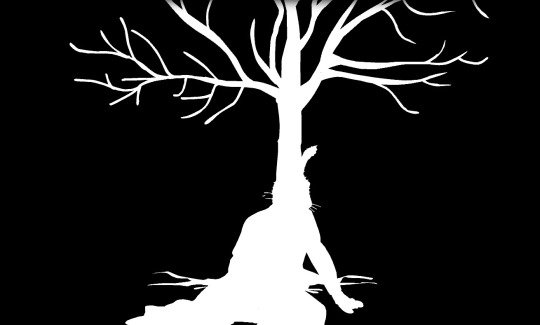

I suspect this is what Rose was reborn into at the end of "The Past Within" and Mr. Rabbit at the end of "Birthday", as tree as the symbol of Naraka was depicted on the sign in "Theater". However, you should not take their new form as literally "trees" - what's so hellish about plants, after all? It seems to me that those who go through the process of (metaphorically or literally) turning into a tree and passing into this new form of life become part of the forest at the bottom of the lake, and the Lake itself is what Naraka is, an infernal creature.
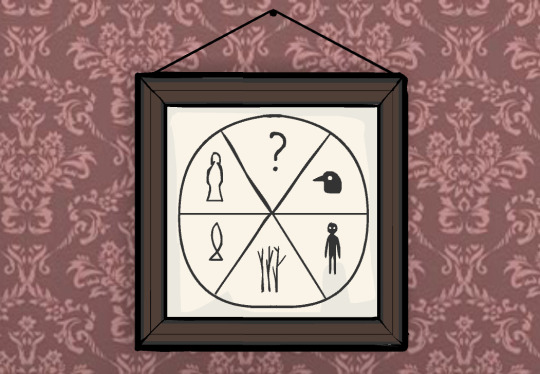
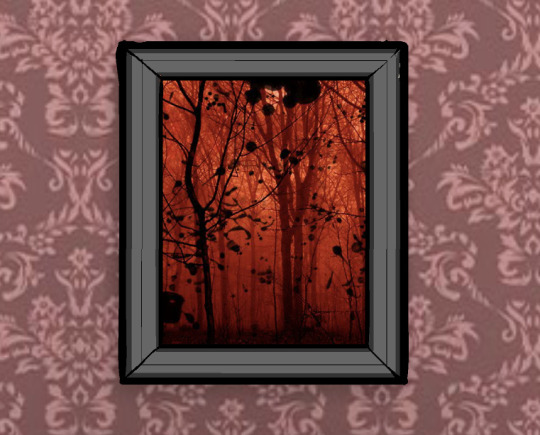
More than once in games characters have referred to the Lake as something sentient. The Lake needs memories, the Lake is able to reward with enlightenment and the Lake is able to punish those who disobey it. Here everything is not quite like in Buddhism, where hellish beings are considered to be the lowest of all creatures, because in “Rusty Lake” series this role seems to have been dutifully occupied by lost and suffering Corrupted souls, while Naraka | Lake is a kind of strong and, perhaps, cruel entity, whose wishes even Mr Owl and Mr Crow choose to respect, so as not to have unnecessary problems later. Therefore, maybe Dale is so interesting to them, because even if the Enlightened Ones have to live in harmony with Naraka, with the Deity on their side, no one of them will need to obey the wishes of the Lake.
I find it difficult to answer who exactly gets to be reborn into a part of the Lake, because Albert, for example, deserved this much more than his daughter, but perhaps it should be noted that in this universe the morality is rather gray. It’s possible that the fact that Rose tried to deceive nature and the standard rebirth system and whatever Mr. Rabbit was up to, from a universal point of view, is considered to be much worse than a couple of murders of family members. I mean, this is what some people here were rewarded for, pf.
#Rusty Lake#Cube Escape#Cube Escape Theatre#Cube Escape Birthday#The Past Within#Rose Vanderboom#Mr Rabbit#textual idea
89 notes
·
View notes
Text
As I continue to scratch like a little beast at the concept of fate in Patho Mark Immortell unfortunately needs to be discussed. Specifically Mark in Patho Classic, because he’s just so……. What the hell is going on with that dandy Mephistopheles. I have to know.
Mark is clearly cognizant of Patho’s narrative to an extent, and seemingly represents another play on “lines” as a mechanism for prophesying in Patho. As Artemy knows the lines in viscera as a Haruspex, Yulia/the Mistresses know cause-and-effect chains/threads of fate, Mark knows the lines as in theatre. Eva describes Mark’s performances thus: “Staggering, prophetic performances! They predict fates. […] Two ritual Masks pick a volunteer from the crowd. Mark looks at his hands, then shows them to the Masks. They improvise. Without a word they play out either the nearest future or the whole life of the person—depending on the price. And it always comes true!” Notkin says, “They say they tell your fortune, right? Might be just a game, might be note; it does come true. I think though that it’s Mark himself who manipulates the events to align someone’s life with his ideas. […] I mean, [his predictions] do come true, though not every time, and if they don’t, he explains it away as a metaphor, or says they did come true but we didn’t notice.” Notkin differs from Eva’s depiction somewhat; at least, he complicates whether Mark’s performances really come true, and this reliance on metaphor to me is reminiscent of an idea in Patho where obfuscation, story-telling, or performance are the most efficient means to communicate truth (lovely Nina is an apparent exception but I am not talking about that right now <3).
For instance, a Town child tells the player, “Mark—he knows the truth and is afraid to distort it. That’s why he uses masks, puppets, and riddles.” This echoes Katerina’s line, “I can’t leave my smoke and mirrors be […] Because I cannot lie when it comes to details… My lips literally cannot enunciate something that is untrue. Riddles and vagueness leave me a degree of freedom.” Mark himself voices something similar: “Like any game, play-acting is a mere shadow of Existence, a tiny fragment of it, a semblance—not a hollow semblance, mind you, quite the contrary, filled to the brim! Play-acting is fuller than reality... since it’s smaller.” To me, this gestures to how storytelling and theatre—with their ability to exaggerate reality—allow one to address issues in a roundabout way which can be more efficient than clear-cut truth. Simplicity is absolutely a necessary tool, but can inevitably hinder necessary nuance, and I think that is what Patho is getting at here. Similarly, it’s suggested that people *interpret* these plays rather than the acts being clear depictions of future events, e.g. when Mark talks about the bull in the Bone Stake Lot incident: “Everybody started to talk about it, interpreting and reinterpreting the… act. Just like they do with our very own Mask Act here. The prophetic excitement is growing by the hour…” just as he later says, “No, I am no longer a mime show interpreter.” All this suggesting that Mark perhaps interpreted simulacra or semblances, and this is how he understood Pathologic’s narrative.
Characters further suggest that Mark’s Masks did not merely show the future, but enforced it. Daniil says, “You were a puppeteer. Your Masks foretold our future—or maybe imposed it upon us; in all honesty, I don’t see the difference.” Maria similarly states, “his performances don’t show a person’s fate, they impose it,” and Lara says, “Mark’s mime shows seem to incorporate us too… everyone’s playing along to avoid disrupting the performance, and that’s exactly how he’s manipulating us.” I interpret this from the meta angle, because obviously the Theatre demonstrates the game’s events, which the characters act out because. Well. They are characters. Even Mark doesn’t appear above it all, as Lara says “I think it’s the Masks who play him and not the other way around,” and Mark refers to himself as an actor, such as when he muses that “I’ve been thinking about leaving this place of the dead for a while now, but I get the feeling that this is exactly the place for me to fulfill my part…”
Though, Mark obviously more often references the player’s role as an actor, which again points to his understanding of fate. Namely when he tells Daniil “[The next performance is] for you to decide. You are part of the lineup. The playscript is not yet complete, you see. […] Your fate isn’t bound yet. It will take time, effort, and of course your direct participation. Come to see us every evening. We’ll show how you’re doing bit by bit.” This dialogue is obviously stepped in the meta: the playscript depends on our actions, as the game unfolds according to our choices in words and deeds. This reminds me of how the Mistresses and Simon’s fortune-telling all seems to juxtapose predetermination alongside some kind of free will. That is, while there is room for a player to subtly influence the narrative’s progression, it is obviously all set out for us in the end. It has to end in a particular way, and it feels like this is what Mark understands. Namely when he discusses the three families with Daniil, and when Daniil asks which will be victorious, Immortell says, “You don’t need me to tell you that; the answer is yours. They're so different... Which one do you prefer? […] It's up to you.” Mark knows that the player must inevitably side with one philosophy according to their choices: choice decides the outcome, but that outcome is obviously already determined.
Mark instead tells Clara that she is “against the rules” because she is “an imposter and a changeling.” Against the game’s rules, presumably as Clara is the only character capable of breaking her fate and so going off-script, as it were, in Mark’s performances. In the secret endings, the gamemakers say that Clara’s twin was a “gimmick of choosing one’s own fate” and that “She was indeed conceived as a disease, an instrument of the Law… but she was born a thief. At the very moment of her birth, she got a chance to become someone completely different. The girl came into this world, having stolen for herself the fate of a miracle-worker.” From a mechanical standpoint, Clara is obviously unique in that she has a choice—most people probably know that curing all the Bound allows you any choice, but that aside, Daniil and Artemy have only one decision. So setting aside that Clara obviously is still bound by a preset narrative, she is capable of choosing to oppose her predetermination and thus the capital-L Law, as fate/inevitability/the Law are closely intwined and often conflated. Breaking the Law is indeed ‘miraculous,’ which is referenced in a dialogue between Imortell and Daniil about the Polyhedron:
Mark Immortell: […] First of all, I also believe in lofty ideals—don’t let anyone tell you otherwise. […] But recently I came to realize something that has blown me out of the water completely and made me reevaluate my worldview. So... I believe in Vlad's transformation.
Bachelor: What did you realize?
Mark Immortell: That fate can be overcome. I’m so tired of all this... You know, many people consider my shows to be mere tricks—but I know that’s untrue. They are daily reminders of Predetermination reigning over us... it’s depressing. But now I see that a miracle is not completely impossible.
Bachelor: Please, go on! What makes it possible?
Mark Immortell: It’s the Tower. The only thing that leads the plots of my performances astray is the Tower. The Tower—and everything that has to do with it... those are the only things that cannot be tossed and turned and manipulated like puppets. A miracle overcomes the inevitable. The Tower can do miracles. It all makes sense.
Bachelor: I’m not sure it does.
Mark Immortell: You will still have an opportunity to ponder it. The Tower is an ambiguous phenomenon. There’s no need to rush to conclusions. I have, as you can see, fallen in love with it... I think of it as my safe haven. But you should keep a cool head.
I am gleeful about this dialogue btw there is so much to work with here. For one, it maintains the link between opposing fate and the miraculous found in Clara’s character, as Mark’s conviction that “fate can be overcome” derives from the Polyhedron’s capacity for miracles. Again, then, the miraculous is positioned opposite inevitability and fate. But what is Mark’s actual relationship to Utopia and the Utopians? I have always wanted to throw up blood over Daniil and Mark’s final conversation. When he tells Mark, “I thought that the whole point of the Utopians’ ideology was neglecting the laws of fate and the limits it imposes upon us,” to which Mark replies, “You are correct, oh the keenest of the astute! So what? I have cognized this side of Existence from backstage, so to speak; from where the strings go and the machinery is hidden—and yet I willingly swore allegiance to the Utopia. Does that tell you nothing?” That line goddamn haunts me. It always reinforced to me that there is an undercurrent in this game that people should strive for utopia, even if it’s a perpetually doomed endeavor, given Saburov and Eva’s statements to this effect. Mark appears sincere in this, given his “I also believe in lofty ideals” or how he gives his life to Maria; Katerina claims that Maria is the only one who can influence Mark, and indeed we see his collusion with Maria in the Changeling Route.
But Clara throws potential doubt on Mark’s allegiance to the Utopians when she reports to Katerina, “He’s not one to side with either the Utopians or the Humble. He stands apart.” [or] “Maria thinks he’s under her charms and in the ranks of the utopians. He’s playing along [with her]. But that’s not how it really is!” I think Mark could well be playing along with Maria, considering a dialogue with Andrey where he suggests that Mark “Claims that the local mimes can tell the future. As for me, I think he’s making fun of the Mistresses—and, by extension, of us all.” Maria herself says of him, “He makes me anxious; his performances don’t show a person’s fate, they impose it. I’d really like to see someone grab and pull the puppeteer’s strings. […] one day I shall tame this crafty imp—no matter what it takes.” “Makes me anxious”?? Maria of Scarlet Mistress fame ??? This reminds me of Mark’s voice lines “There is a great ability in knowing how to conceal one's ability,” and “It is sometimes necessary to play the fool to avoid being deceived by cunning men.” These lines need not necessarily be related, but imply a deceptive character that suggests he could be following Maria’s lead out of amusement.
Another suggestion that Mark is taking the piss is that he quotes Professor Pangloss from Candide, who represents the naïve optimism and theodicy Voltaire lambasts: “All is for the best in this best of the worlds” (Всё к лучшему в этом лучшем из миров/Tout est pour le mieux dans le meilleur des mondes possibles). The Utopians are not necessarily naïve optimists, but are dreamers who ascribe to the miraculous, even emphatically self-proclaimed rationalist Daniil. Theodicy also intended to vindicate divine justice, and Patho’s narrative involves its own ‘divine justice’ through plague; so Mark quoting Pangloss feels quite tongue-in-cheek to me.
Whether Mark is a sincere Utopian… As with everything, it’s open to interpretation. I think he is, given that dialogue with Daniil. Mark seems aware that he is only pulling people’s strings in that his performances reflect a predetermination that he is subjected to as much as everyone else. He appears genuinely intrigued by the miraculous (as in: fate can be broken) in his claim that he has fallen in love with the Polyhedron as Daniil or Eva. Likewise that he claims Clara is a “worthy opponent” as a miracle-maker, given that she defies fate and so overcomes the inevitable. I find it particularly notable that Mark considers the one thing that ‘leads the plots his performances astray’ his “safe haven;” but, I also think Mark is frankly cheeky about the whole affair because of his narrative awareness which also sets him apart from other characters.
#this one's for you Ruby#you understand my pain and suffering at being forced to think about Candide again#pathologic#mark immortell#patho.txt
19 notes
·
View notes
Text
Muu & the Significance of Her Shoe
Okay hi, I’ve poked around the Milgram fandom on tumblr and I’ve finally decided to write out an analysis/theory on my own - I don’t think it’s super well known but I’m also not super present in Milgram tumblr, so if I’m beating a dead horse here ignore me, but I think a crucial part many people miss about Muu’s crime is the significance her shoe plays. It’s quite literally, in my opinion, the difference between forgiven and unforgiven in my eyes
(TW below for s/h, bullying, and murder (for my mutuals who don’t know what Milgram is))
Alright, so the deal with Muu’s shoe - the right one specifically - is how it’s been drawn off her foot. It’s not excessively common, but it made an appearance in her anniversary art-
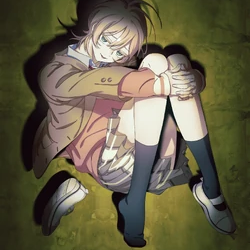
-and it’s important to note this is not a metaphor for anything. In only a few frames of After Pain, it can be seen as Muu kills Rei, on the ground and clutching the knife that her right shoe is off her foot, sitting behind her.
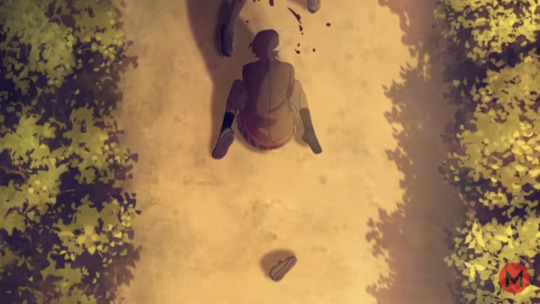
If you didn’t already see where I was going with this, it points towards Muu tripping.
Muu was at her breaking point when the murder occurred. In the scene just before, she was on the bathroom floor, being looked down on, laughed at, and photographed by the girls she was previously in a sort of clique with. Eventually, they disperse, leaving only Rei who walks away saying nothing after a moment.
This is clearly shown to be the straw that breaks the camel’s back: Muu runs out of the building, floundering and blurry-eyed with tears. Rei stops and turns towards her as Muu reaches her and catches her breath, Muu tries to say something to her, Rei tries to turn away and..
The scene cuts to Muu stabbing Rei with a box knife, then shows Rei dead while Muu sits before her, staring down at the knife and heaving.
Everything in this scene, from Muu in the real world to the hourglass symbolism, depicts that this was a genuine shock for Muu. Muu looks purely terrified both as she’s stabbing Rei and after as she stares down at the knife realizing what she’s done. The hourglass doesn’t suffocate her as it would’ve, it shatters - this wasn’t meant to happen.
You’ll notice in the scene just before the murder, Muu is having water poured on her by the girls in the bathroom. She’s lying down in water, and to leave she would undoubtedly be getting her shoes wet. Combine wet shoes with blurry vision, stumbling, and desperately chasing after somebody, and it makes sense that Muu would fall.
Why she had the box knife on her in the first place is more tricky to explain. My personal theory is that it ties some way into self-harm. Box knives specifically are often used in depictions of self-harm (Menhera-chan is a good example), and knowing what we know about Muu’s mental state at the time, I don’t think it’s entirely out of the realm of possibility. Muu would likely have never dealt with anything of such magnitude, and egotistical as she may be, I don’t doubt she genuinely felt the whole world was against her at the moment. I think there’s many means by which she could’ve turned to self-harm, and because of the sheer variety of reasons different people have for it it’s difficult to speculate what her’s might have been, but I do know I’d understand if by some way she ended up there.
So, to summarize this theory with as little bias as possible:
Muu had taken to carrying the murder weapon around with her, as a result of a growing habit of self-harm. After school and a particularly bad encounter with the girls who’d turned on her, Muu’s left both physically and mentally unstable - she’s clutching her knife (having just self-harmed or initially about to) her vision blurs, her steps are shaky, she’s fumbling to catch Rei, etc. She finally catches up to Rei who turns to hear her, tries to apologize and put an end to it all.. but Rei only begins to turn away. Panicked and desperate, Muu reaches out to grab Rei once more, and her shoe slips off. She trips, knife in hand, and before she can do anything about it she’s stabbed and killed Rei.
She’d never meant for it to go so far. It’s important not to forget that Muu is in high school, and for the most part, she’s had a relatively normal life. Sure, she certainly wouldn’t like Rei or any of the girls who turned on her, but never had she intended to kill any of them.
The following part is more blatantly biased, it’s me advocating for forgiven Muu LOL - I think my phrasing in general has been generally biased towards her, but I do want to make it clear Muu is not a good person.
It’s Not My Fault makes it clear she has a faulty understanding of her role in the whole situation. If it weren’t for her initial behavior, this never would’ve happened in the first place. She’s insanely vain and controlling over who she calls her ‘friends’ and shows to mercy should they ever go against her or not even simply not attend to her every whim.
Muu expects utter obedience from everyone, and when she doesn’t get it, she ruins them. She’s not a good person.
But she’s not a murderer.
At least for the murder specifically, she’s a victim of circumstance - she couldn’t have predicted tripping, and I don’t think she ever intended to pull the box knife on Rei. You can see on her face just how horrified she is at herself when she sees what she’s done and while the hourglass shatters around her. She’s a high schooler in high school drama, and then all too suddenly it’s escalated way beyond comprehension, and more than ever she feels she needs to shift the blame to anything other than herself.
‘It was an accident’ doesn’t just cut it, as seen in the T2 voice drama where she openly says she had ‘no way out but to kill someone’ or that it was ‘revenge’. Honestly I think she’s lying here just based off the pure shock she had on her face and the fact that she probably thinks she was voted Forgiven without the knowledge that she tripped - if the Warden perceives ‘revenge’ as Forgiven, then of course it was for the sake of revenge. I think that’s also partially why she says “What was it called again… Revenge… Revenge? That means revenge can be [an acceptable motivator], right? And if you don’t forgive me this time, that’d mean that it’s not.” I interpreted this as sort of gauging why Es voted her Forgiven and hinting that she in a sense changed her mindset to almost convince herself it was a revenge-oriented murder, as that’s what Es has forgiven
This is a take on Muu I don’t see super often, probably because I’m a heavy Muu sympathizer. Obviously 💀 But I think it’d be fun just to put it out there even if it has quite a few holes
That’s about all from me, if anything’s off in my interpretations it’s because I’ve been stuck in Reverse 1999 hell and I’m steadily easing back into Milgram 😭😭 I’ve forgotten a bit of my previous analyses of Muu ngl
This is very far-fetched speculation please keep that in mind LOL
24 notes
·
View notes
Note
Hey op just curious what makes you hate the new Hellsing fanbase. As a fellow Hellsing fan I was wondering if I’ve completely missed something strange going on lately.
The new Hellsing fandom honestly irks me because of the surface level probing of the source material*. Yes, to most it's a hard core, dark, violent, mad and bad-ass anime but, like I've said so often, for so long on this dumb blog, it has the BEST female characters I've ever seen, recently rivaled by Arcane. Incredible depiction of platonic relationships and morally grey characters. To me, it's primarily a found family story, among other things.
The side characters are incredible, Yumi and Heinkel are the most underrated of the show. I mean come on priest and nun lesbians (lesbian used liberally). Heinkel is confirmed by the author to be an INTERSEX HUMAN. Alucard shapeshifts into a female (which, looking at the Devilman fandom, everyone took for an obvious trans metaphor, why not here?). The source material is as homoerotic as it can get between a lot of the characters (the tension between Sir Integra and Seras during the blood scene). Let's not forget Rip van Winkle, Pip, Walter, and Alexander. Alucard's teasing, Seras' naivety and subsequent maturity, Pip's endurance and playful wittiness. These characters and relationships are stuck in my head forever, they're all incredibly unique, fleshed out and worth remembering, no matter how short a time they spent on screen. And the character designs? As a long-time vampyr and catholic guilt fan, can I just say. Rawr. This show shaped how I dress like irl and my own shitty characters, as well.
Sir Integra is my favorite character of the show and one of all time. Sir Integra Fairbrook Wingates Hellsing. Like, an actually good depiction of a no-nonsense, androgynous as hell, unabashedly commanding (dare I say) woman? And it's played completely straight? No "Whaaa that's a woman?" every 2 seconds or "heh, you will listen to me despite my womanhood" from her. Powerful in her own right despite being the few "magic"-less humans of the series. 0 sexualized Ultimate scenes (sorry Seras and the "hot down there" comment doesn't count, that was banter). She was fucking knighted by the Queen of England before she was even 25, hence Sir Integra. Canonically bi-racial and South-Asian. I'm not even going to go into her character's willpower and values but. Hellloooo???
Not to mention, something noteworthy about the series, but Hellsing works because Hirano made time for silly moments. I mean, hell, one of the scenes I remember most vivdly was the gag of Heinkel lighting Sir Integra's cigar and being mega-pissed about it during the final battle, it's funny yet in character, despite many fans saying the humor throws you out of the "reality" of the show.
Oh no, but what do the new fandom gremlins talk about? "Alufart rails Y/A" "OMG VLADCARD'S BARA HAIRY TIDDIES I WANNA RUB MY FACE AGAINST THEM" (you know who you are) “I drew the most fucked up version of Alucard I could think of in my twisted mind”
and my personal "favorite":
"omg 🥺 what if intewa and alucard kisswdd", it's almost as bad as Seras x Alucard.
Unfortunately, I am a part of the ship police, so I'm gonna say right now that these two are my most hated ships:
1) Sir Integra and Alucard's relationship goes beyond romance to me. Since none of the new fans know the lore, Sir Integra is and will die a virgin (canon), it's literally plot relevant because by having sex, if she gets bit she will become a zombie slave (obvious but apparently needed to be said) and, taking a note from the 2001 anime, gone is any chance to continue the Hellsing mission. If she was bitten, plot armor aside, she'd have to off herself instead of becoming a vampire. (and for you freaks out there/pos, dare I say… ace representation? you can argue about desire and subtext later)
2) Seras and Alucard's relationship was specifically noted by the author to be a father/daughter dynamic, which is kind of obvious in the show. Like I said, fundamentally a found family series. Yeah, you don't need to treat found family like family family but I gen can't stand this ship.
I know that people will ship characters who've never been in a room together before. I can't stop people from shipping them and these two ships have ALWAYS been popular in the fandom. I typically ignore this and, yes, "don't like, don't interact" is my main rule. However, new fans ONLY talk about this stuff. None of the rest of the show seems to matter, just Alucard's hairy mustached tig bitties and him fucking one of the two women in the main cast. Or someone's self insert.
((tangent but personally my favorite ships are Alexander x Alucard (obviously in an enemies to enemies way), Heinkel x Yumi, and a romance only Seras x s.Integra. Like, you want old women yuri??? There ya go! They were in a mansion for like 30 years (I forgot) together, probably going missions alone and sharing their grief over Alucard and their unique experience/history. Like I said, I can't help who people ship, I'm not trying to say the source material is in favor of my ships or "how dare people interpret these obviously gay characters as straight". like no, that's not why I'm upset and ik alucard and alexander weren't yaoi-ing it up but like. alucard and s.integra shippers dni /j))
Not to mention, I couldn't help but notice, despite this information being readily available to my middle school self, no one knows the fckn lore or background of this show?? I honest to god saw someone comment that Hellsing Ultimate™ was a bad “remake” because it diverged from the original anime.
Here's SOME fun facts:
-the 2001 version of the show has a different ending than the manga because it wasn't finished yet (duh). Hellsing Ultimate is "soooo short" because production took almost a decade and it was trying to be a faithful, well-animated (that takes time bruv) adaptation. Oh, and a bunch of directional changes that I won't get into.
-there are multiple OVAs following Walter's youth in WW2 (Hellsing: The Dawn). Young Walter's design honestly was one of my favorites from the series so. Walter enjoyers. Check it out.
-there is a bonus book explaining a lot about the characters and process of creating Hellsing written by Hirano himself. whenever I got a hold of it, though (8+ years ago) there was no English translation.
-Alucard didn't just transform into a girl that one time, he was in his girl form the entire time during WW2 (hence why when people mention his possible affair with the Queen it might've been a sapphic thing but I think that mostly stems from the abridged series. the queen thing not the girl thing)
-Hirano used to be a Hentai mangaka and actually designed many of Hellsing's characters in said hentai or in short stories (such as Crossfire, it's basically extra, non-canonical Hellsing content) beforehand. Which, this used to be the most popular "fun fact" but has been lost to the sands of time now, so prepare for a lot of people rediscovering this.
-personal lore is I almost named myself Rip van Winkle bc of this show (quirked up Portal, Grell Sutcliff, queer-coded, rifle-wielding shawty)
Anyway, to sum it up, I hate when people don't interpret characters in the same way I do. Yes, I am a bad “fandom elder”, idgaf I am fundamentally a hater.
*I keep seeing this happen with old shows that resurface. Unlike newer or more popular shows where every scene gets scoured, characters who showed up for one scene get analyzed, and endless cafe AUs are made- older shows mostly get fan art of the main charas and the ships of the two hottest characters and that's it. Discussion of lore and themes are completely off the table. So I'm not surprised, just disappointed.
#long post#hellsing ultimate#hellsing#alucard#integra hellsing#seras victoria#et al#yeah i just get this way about media i've fundamentally tied to my person because I watched it as a kid and hyperfixated on it my bad#hellsing ova#lore dump#anyways rant over#sir integra#me#run on sentences aren't real#I heart hating#goddamn protestants#intersex#aromantic#gay people#queer coding#idk tags#did I mention it was a long rant post#oh and if I see “is Integra a woman” one more time...#edit for typo#oh and#lesbian#found family#enjoyers watch this show except don't if youre gonna be annoying about it
35 notes
·
View notes
Text
Unknown / Nth analysis
My post got some notes so now you must all read my Hozier lecture. You have no choice.
SOME DISCLAIMERS: I am currently in the process of reading Dante’s The Inferno so most of the information about it is pulled from the internet/prior knowledge that might be completely wrong. Feel free to correct me/add to the post with more information that I left out because I am sure I will leave out something. Also, most of this is my own personal feelings on the matter, art is subjective!! And if you disagree, I would love to hear it, discussion is what makes art and music and fandom fun. With that, onto the lecture.
BACKGROUND: As Hozier himself says in this interview, the song is about Treachery, the ninth circle of hell as Dante describes it in his Inferno. It depicts feelings of betrayal, loneliness, and longing as told from the perspective of God freshly betrayed by the one he most trusted, Lucifer. This is where most of the imagery in the song comes from. (I think that is super cool). I’m also gonna talk about my own interpretation of the song from when I first listened to it, since even without the background knowledge it’s such a powerful song. For convenience, the person singing the song is gonna be called “the speaker” and the person they’re singing to is gonna be called “the betrayer.”
You know the distance never made a difference to me – right off the bat Hozier is crushing our souls. This first line establishes so much love and longing its almost painful- feelings that have persevered despite past obstacles and will continue to persevere for the foreseeable future. The speaker has been separated from the betrayer before (past tense MADE implies this is not a new struggle to them), and the betrayer knows that.
I swam a lake of fire, I’d have walked across the floor of any sea – again, the speaker is proving their devotion by professing the things they have done, and what they are willing to do in the future (I SWAM a lake of fire, I’D HAVE WALKED across the floor of any sea; past tense to future). What I realized after Hozier talked about the inspiration for the song is: this line is referencing how Lucifer got into hell. The “lake of fire” refers to the punishment/imprisonment he received for his betrayal and what he has already endured by being separated from God, the literal and metaphorical hell that he had to go through in order to be in the position he is in. The “floor of any sea” refers to the frozen ocean he is trapped in, the one he is constantly trying to escape. God created this prison, and yet he would have been willing to traverse it.
Ignore the vastness between all that can be seen/and all that we believe/so I thought you were like an angel to me – This line is talking about the reality of the situation versus the image the speaker has in their mind of the betrayer. If they ignore what is actually happening (all that can be seen), they can still remember the betrayer as an angel (all that we believe). Incorporating the divine a little bit, this line could also be talking about the distance between heaven, the mortal realm/earth, and hell.
Funny how true colors shine in darkness and in secrecy – Pretty straightforward as far as the verses in this song go; a slightly ironic tone that acknowledges a betrayer’s tendency to never fully reveal themselves until it’s too late.
If there were scarlet flags, they washed out in the mind of me – Though again ironic and slightly self-deprecating, the message is heart-wrenchingly simple. The speaker loved the betrayer so much they couldn’t see the warning signs of their deceit/ chose to ignore it in favor of looking at all of their goodness. This line begins a phenomenon that I like to call “the Humanization of God.” God is supposed to be all knowing/all-powerful/whatever else you attribute him with. Yet he didn’t see the warning signs of betrayal from his closest friend, something painfully human.
Where a blinding light shone on you every night/and either side of my sleep/where you were held frozen like an angel to me – The “blinding light” this is referring to could mean three things (or all of those things at the same time): 1)it represents a pedestal/spotlight that the betrayer was put upon by the speaker, which is why red flags were so easily ignored. The speaker looked up to the betrayer so much they couldn’t fathom them possibly being anything other than perfect. OR 2) In the third installment of the Divine Comedy, Dante is enveloped by a “blinding light” that raises him up to heaven and allows him to see God. Therefore, the blinding light could reference the divinity Lucifer held before his betrayal, something that God thought would mean he was stuck as (FROZEN, even) an angel, and therefore unable to betray him. OR 3) this verse is talking about Lucifer after he’s already been trapped in hell, with the “blinding light” being the surface he’s trying to escape to. This interpretation would be especially sad because of the line “you were held frozen like an angel to me”, implying that even after his betrayal, God still sees Lucifer as an angel, not as a sinner or a demon. Even without the biblical context, the speaker still holds good memories of the betrayer after all is said and done, choosing to remember them as an “angel” rather than reflect on their horrible acts.
CHORUS TIME- there’s a quote that I always think about when I listen to this chorus: “To be loved but not known is comforting but superficial. To be known and not loved is our greatest fear. But to be fully known and truly loved is, well, a lot like being loved by God.”
It ain’t the being alone/It ain’t the empty home baby/You know I’m good on my own - the speaker has very clearly been alone before, which is sad because it implies that the betrayer is the one who alleviated this loneliness, providing company where there previously was none. Now that they’re gone, they’re back to being alone. Also the implication that the speaker confided in the betrayer about this past loneliness (YOU know I’m good on my own) makes their abandonment so much more heartbreaking.
Sha-la-la, baby, you know, it’s more the being unknown – Something new to the speaker, though, is the feeling of being unknown. God has always been placed on a pedestal, with no one to keep him company except his angels. Lucifer was the first angel, known as the angel of Light, and was someone God trusted and confided in. God thought he knew Lucifer, just as Lucifer knew him, and now with his closest friend gone, he must return to that lonely position of power, unknown to any other angel or worshipper as anyone other than God- distant, all powerful, unapproachable God. And maybe this betrayal is what forced God up into heaven in the first place, doomed to never again be known as he was by Lucifer. In a way, that’s almost exactly like the punishment he’s given to his betrayer.
So much of the living, love, is the being unknown – This line reads surprisingly hopeful to me. It’s an acknowledgement of the situation, sort of saying “oh well, that’s life” to the most famous betrayal of all time. The most important part about this line is the tone; there’s no bitterness, no resentment of the circumstances or the people that have led them to this situation.
You called me angel for the first time, my heart leapt from me – This line is talking about the first time the betrayer and the speaker met, and how that interaction affected the speaker. It also speaks to how much one person can be changed by another’s affection. As soon as the speaker was called angel, their heart was no longer their own, trusted entirely to the betrayer to use as they will. It also seems the decision was at least a little bit unwilling on the speaker’s part (the phrase “leapt FROM ME” implies unwillingness; the speaker didn’t GIVE their heart away, it jumped from their grasp). Point is, the speaker was definitely in denial about how close they were to the betrayer. Another instance of humanizing God in the context of the story, for though he is often depicted as loving, you never really think of him as having a heart to be broken or to be given away to his most trusted.
You smile now, I can see its pieces still stuck in your teeth – the imagery in this line is insane; the speaker’s heart was literally chewed up and spit out by the betrayer by their act. The fact that literal scraps are seen in a SMILE shows the betrayer still deceiving, trying to placate/make friends with the speaker even as their heart is in literal pieces because of their mouth. This is also another reference to the Inferno- Lucifer is described as a three-headed demon, with each of his mouths chewing on the bible’s/history’s greatest betrayers: Brutus, Longinus, and Judas. Brutus and Longinus are being punished for their role in Julius Caesar’s assassination by being stuck feet-first in Lucifer’s mouth. Judas receives the worst punishment of the three; his head is being chewed on while his back gets scraped up by Lucifer’s claws.
And what’s left of it, I listen to it tick/every tedious beat/going unknown as any angel to me – This. Line. Oh my god. Even in the teeth of their betrayer, torn to shreds, the speaker’s heart is still beating and alive, just as their love for the betrayer is. And after thinking it over (“listening to their heart”), they realize that maybe they don’t know their own heart as well as they thought. Because what heart would love a betrayer? (A HUMAN ONE, PROBABLY. HUMANIZATION OF GOD.) Also, the use of angel, not as a term of endearment as it was previously, but in reference to a group (unknown as ANY angel, rather than MY angel or THE angel) indicates both God’s realization that he didn’t know Lucifer as well as he thought and a resolution to never trust or hold another angel as close ever again.
AND NOW FOR MY FAVORITE PART!!!!!!!! BY FAR THE BEST PART OF THE WHOLE SONG IN MY OPINION. Setting aside the lyrics and the meaning of the song, just the pure power of Hozier’s voice in this section gets me every time. So much of a change from the easygoing guitar that’s made up the rest of the song- there’s like a heavenly chorus behind him, he’s singing at the top of his lungs louder and higher than any other part, it’s just so…. I don’t even know how to explain it. It’s so good.
Do you know I could break beneath the weight?/Of the goodness, love, I still carry for you – Personally, I think the “goodness” that is being described here is the speaker’s hope that the betrayer is still a good person, deep down inside. It’s a hope that is futile and slowly “breaking” the speaker, because the deed has already been done, yet the speaker still carries it. In addition to that, I like to think that the responsibility of heaven was shared between God and Lucifer before his betrayal, and now without him, God is forced to carry the weight and pressure of being the divine creator of the universe all alone.
That I’d walk so far just to take/The injury of finally knowing you – Referencing the line earlier in song (I’d have walked across the floor of any sea) and again stressing the lengths the speaker is willing to go for the betrayer. The best part about this line is, again, the acknowledgement of pain by the speaker. They specifically say “the INJURY of finally knowing you”, meaning that fully, truly knowing the betrayer as they want to would cause lasting harm. Also, the realization that, as things currently stand, the speaker DOESN’T know the betrayer (hence the use of the word finally, implying future), and to know them completely would mean to know the reasons WHY they betrayed the speaker, which would certainly cause “injury.” Yet the speaker DOESN’T CARE. They don’t CARE how hurt they are by the betrayer, how much it WILL HURT in the future, they just want to be with them and if that isn’t the saddest thing-
The closing chorus is mostly the same as it was before (it ain’t the being alone/it ain’t the empty home baby/you know I’m good on my own/sha-la-la, baby, you know, it’s more the being unknown) except for the final line.
And there are some people, love, who are better unknown – my initial reaction to this line was that it sounded surprisingly hopeful considering the rest of the song, much like the line in the first appearance of the chorus. I took it to mean that the speaker accepted the fact that the betrayer was bad for them, and maybe it’s better off that they don’t know them. But looking back at all the analysis about how far the speaker would go, all the injury they are willing to put themselves through, that just doesn’t make much sense (Plus the fact that the speaker still says “love”). No, that wouldn’t be the Hozier way. Instead, I think this line is the speaker blaming themselves. Saying that THEY are the ones who are better unknown, because they’ve tried the whole love and trust thing and look how that turned out. Consider the character of the speaker that’s been built throughout the entire song: someone who gone through hell and is still willing to go farther for someone who clearly won’t do the same, someone who ignored red flags in favor of focusing on the good, someone who trusted their heart to a person who chewed it up without a second thought. This is definitely a person to take betrayal personally, to turn on and blame themselves rather than get angry at the betrayer, the actual person at fault. The rest of the chorus and previous analysis supports this too (speaker is ok with being alone/on their own, but they are NOT ok with being unknown. So, to inflict that on themselves is a fitting punishment). Also, the speaker being the self-blaming person they are, this line could be read as sort of an apology; if they hadn’t let themselves be known, let themselves open up to the betrayer, maybe neither of them would be hurting this much in the first place. It might’ve been better if the speaker had STAYED unknown and alone as they were before knowing the betrayer.
This whole analysis is a cumulation of all the thoughts that have been fermenting in my brain for the past month, so if it’s a bit nonsensical I do apologize. Also, huge shoutout to my friend for listening to my insane ramblings and also helping me edit this, she doesn’t have a tumblr but I appreciate her immensely.
That’s all I got for now, if this gets some traction maybe I’ll post my thoughts about some other Hozier songs (because holy shit are his songs amazing). If you got this far down thank you so much for reading! It feels really good to put all the words down and actually organize them, and knowing that there are people who actually want to read it is so cool.
people who asked to be tagged: @freddykicksasses @allegedlyunmagical @iwillgotoheavenforyou
#unknown / nth#hozier#andrew hozier byrne#unreal unearth#francesca#dante#the inferno#music#lyrics#lyric analysis#music analysis#song#song analysis
59 notes
·
View notes